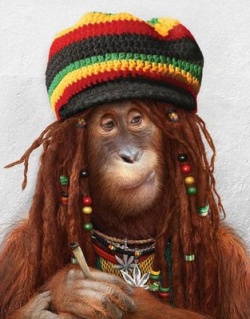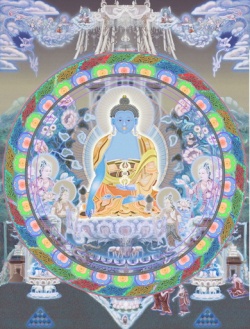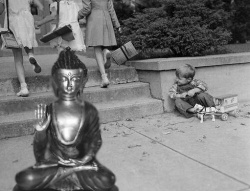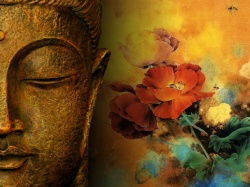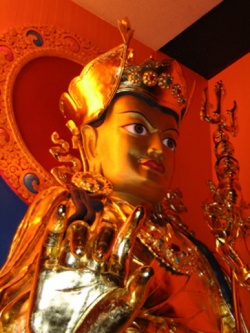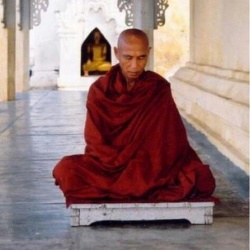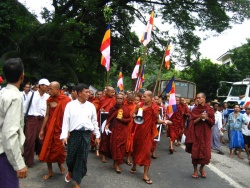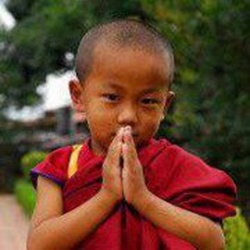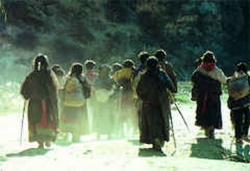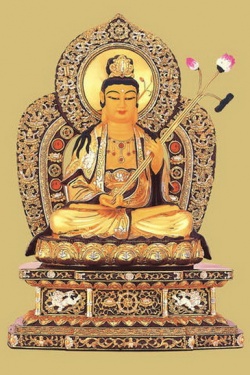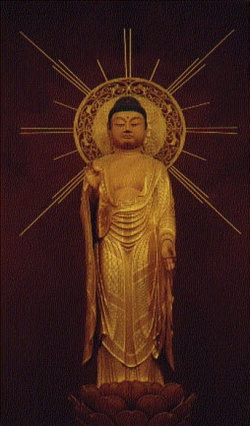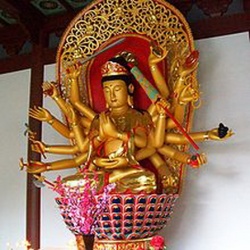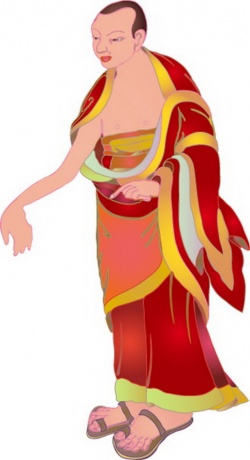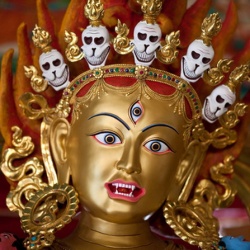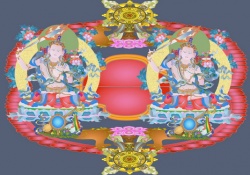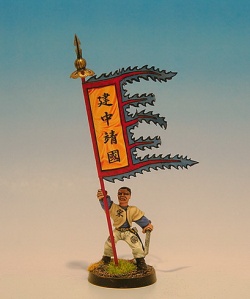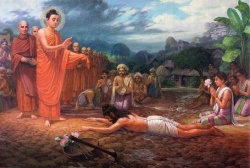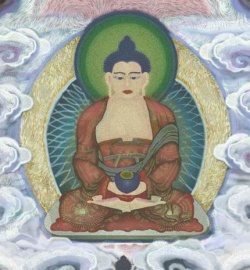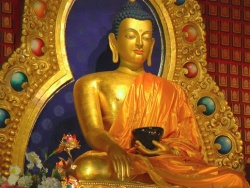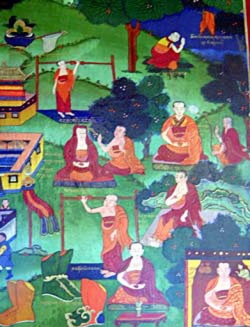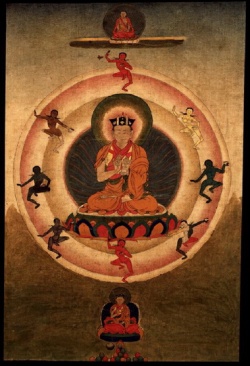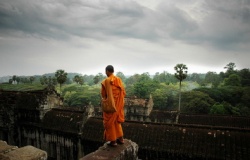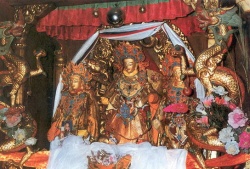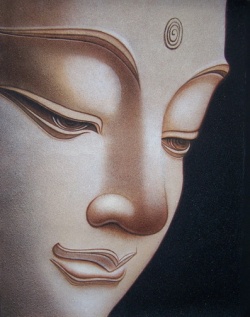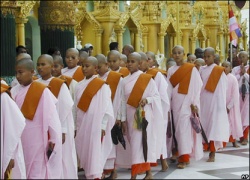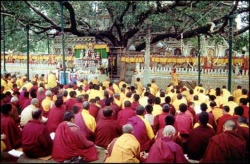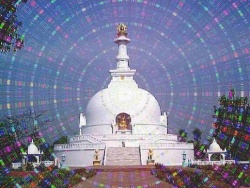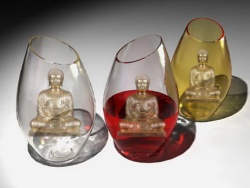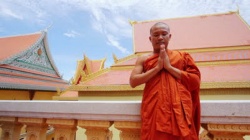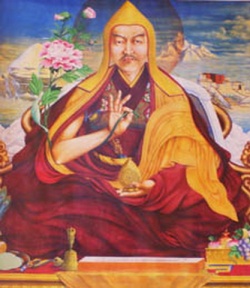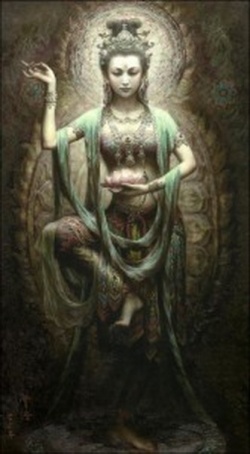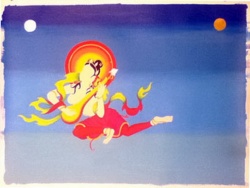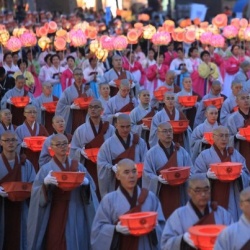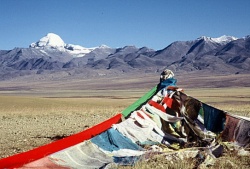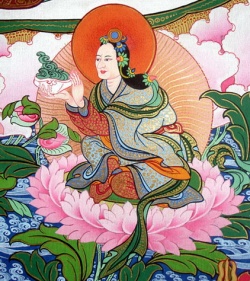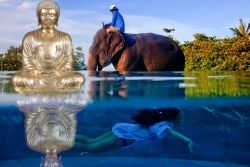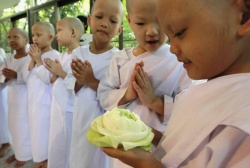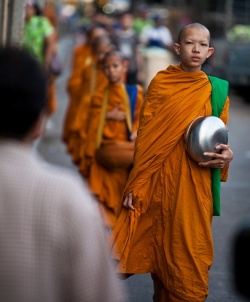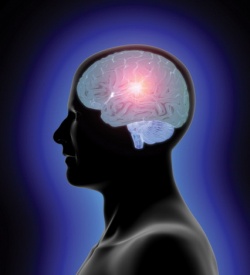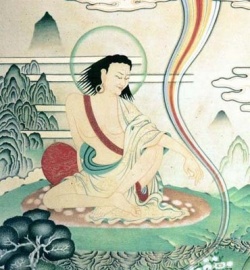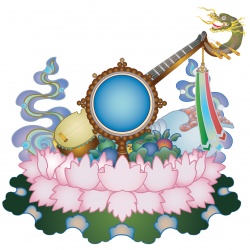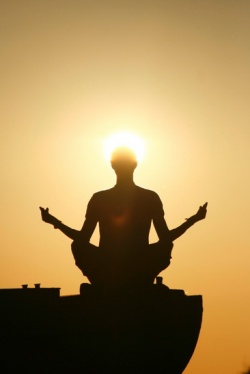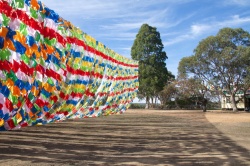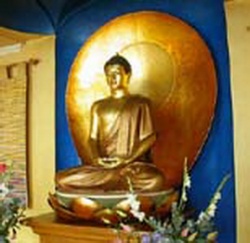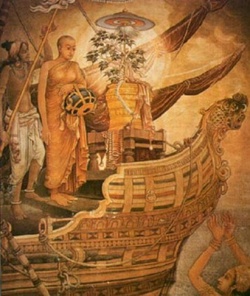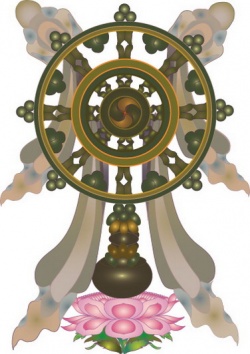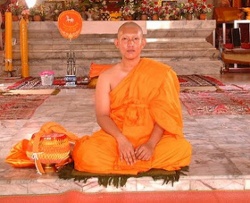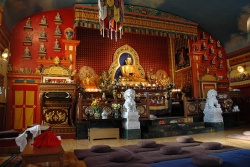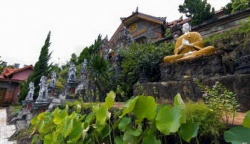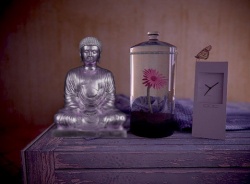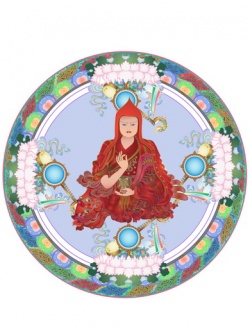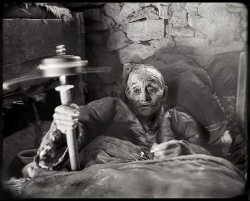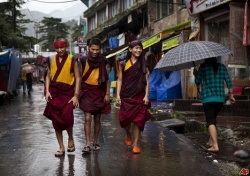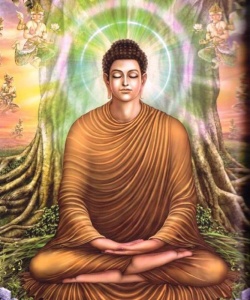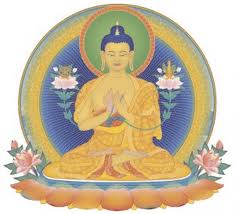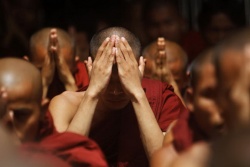Mahayana Mahaparinirvana Sutra: Chapter 19: On Holy Actions
Mahayana Mahaparinirvana Sutra
Chapter 19: On Holy Actions
Translated by Kosho Yamamoto from Dharmakshema's Chinese version,
edited and revised by Dr. Tony Page
Copyright for this edition is held by Dr. Tony Page, 2012.
Then, the Buddha said to Bodhisattva Kasyapa: "O good man! The Bodhisattva-mahasattva should, in accordance with this “Mahaparinirvana Sutra”, meditate exclusively on the five kinds of action. What are the five? They are: 1) holy actions, 2) pure actions, 3) heavenly actions, 4) childlike actions, 5) actions of illness. O good man! The Bodhisattva-mahasattva should practise these five actions. Also, there is one action, which is the action of the Tathagata, the so-called Mahayana Great Nirvana Sutra. O Kasyapa! What are the holy actions which a Bodhisattva-mahasattva practises? The Bodhisattva-mahasattva, following a sravaka or the Tathagata, hears the Great Nirvana Sutra. Having heard it, he gains faith and, on believing, thinks: "The All-Buddha-World-Honoured One has the unsurpassed Way, the greatly Wonderful Dharma, right action for the great congregation. Also, there are the Mahayana vaipulya sutras. As I now love and seek zealously after the Mahayana sutras, I shall sever myself from my wife and children whom I love, my relatives, the palace where I live, gold, silver and all rare jewelleries, wonderful necklaces, incense, flowers, dancing and music, servants male and female, men and women, pages big and small, people, elephants, horses, vehicles, cows, sheep, hens, dogs, hogs and pigs." Also, he thinks: "One's living-quarters so bear down upon one that they resemble a prison-house. All worries arise from this. When one's home has been abandoned, all is silent and open like the Void. All good increases as a result of this. In one's home, one cannot - to the end - practise pure actions with a pure mind. I shall now shave off my hair, leave home and practise the Way." Also he thinks: "I shall now definitely leave home and practise the Way of unsurpassed right and true Enlightenment." When the Bodhisattva desires to renounce the world, Marapapiyas becomes greatly worried and says: "Now, this Bodhisattva will have a great battle with me." O good man! How would such a Bodhisattva fight with men? Then, the Bodhisattva goes at once to a Buddhist vihara and sees the Tathagata and his disciples there, who are all correct in their deportment and serene in their sense-organs and soft and calm in their minds. So he goes there and seeks to get ordained. He shaves off his hair and puts on the three kinds of monastic robe. After having been ordained, he upholds the prohibitional precepts, and he is not lacking in deportment. His movements are peaceful, and nothing is violated. Even a small sin he fears, and his mind to be true (his truthful attitude of mind) is strict and unbroken like a diamond.
"O good man! Here is a man who wants to cross the sea on a floating bag. Then there is a rakshasa (flesh-eating demon) in the sea. He follows the man and begs the bag of him. Hearing this, the man thinks: "If I give (it him), I will certainly sink and die." He replies: "O rakshasa! You can kill me, but you cannot have the floating bag." The rakshasa says: "If you cannot give all of the bag to me, give me half." But still the man will not give (him the bag). The rakshasa says again: "If you cannot give me half, give me one third." The man does not say "yes". The rakshasa continues: "If you cannot, give me the bit where your hand rests, I shall be hard-pressed by hunger and worry. Please give me just a bit." The man further says: "What you seek to have is, indeed, not much. But I must cross the sea this very day. I don't know how far it is. If I give (you) any part, the air will gradually go out. How could I (then) hope to cross this difficult sea? If the air goes out, I shall sink and die half-way."
"O good man! The same is the case with the Bodhisattva who upholds the precepts. He is like the man who desires to cross the sea and who is very solicitous of guarding the floating bag and grudges (giving it away). When the Bodhisattva thus cares to protect the precepts, there will always appear in his way the rakshasas of all evil illusions, who will say to the Bodhisattva: "Believe me, I am not going to cheat you. Just commit the four grave offences and take care of the other precepts. For this, I will give you peace, and you will awaken in Nirvana." The Bodhisattva will then say: "I would rather uphold the precepts and gain Avichi Hell than break them and be born in heaven." The rakshasa of illusion will say: "If you cannot commit the four grave offences, commit the samghavasesa. For this, I will make you attain Nirvana easily." The Bodhisattva will not comply. The rakshasa will again say: "If you cannot commit the samghavasesa, commit the sthulatyaya. For this, you will have a peaceful Nirvana." Again, the Bodhisattva will not comply. The rakshasa will again say: "If you cannot commit the sthulatyaya, break the (rules of the) naihsargika-prayascittika. For this, you will have a peaceful Nirvana." The Bodhisattva will again refuse to comply. Then the rakshasa will say again: "If you cannot commit the prayascittika, please commit the duskrta. For this, you will have a peaceful Nirvana." Then the Bodhisattva will say to himself: "If I commit the duskrta and do not confess before the assembly (of monks), I may not be able to cross the sea of birth and death and attain Nirvana." The Bodhisattva-mahasattva is (thus) very strict in avoiding these very petty offences (prohibited by the precepts), and his mind is like a diamond. The Bodhisattva-mahasattva respectfully and indifferently (calmly) observes the precept against the four grave offences and the duskrta.
"If the Bodhisattva upholds the precepts thus, he is known to have observed the five kinds of shilas (obligations, moral precepts), which are: 1) the precept for the purity of the Bodhisattva's basic actions, 2) the precept for the purity of the fore-and-aft relative actions and others, 3) the precept for awakening to purity and not awakening to things of the evil categories, 4) the precept for protecting (maintaining) right mindfulness and for praying for purity, and 5) the precept for transferring (merit) to unsurpassed Bodhi.
"O Kasyapa! Now, there are two kinds of precept for the Bodhisattva. One relates to secular teaching, and the other is for attaining Wonderful Dharma. If a Bodhisattva gains the precepts for Wonderful Dharma, he does not do evil to the end. The secular precepts can be gained after the proceedings of the jnapticaturtha (one of the ways of arriving at a decision in the Buddhist Sangha). Also, next, O good man! There are two kinds of precept. One (set) is the precepts against originally grave offences and the other is (those) to stop the ill-speaking and hatred that obtain in secular life. The precepts against the originally grave offences are those regarding the four offences. We say "precepts to stop the ill-speaking and hatred that obtain in secular life." That is: not cheating others during trade by making the weight of the scales less or making the measure smaller (i.e. not giving as much of the product as one should) or gaining wealth by taking advantage of another's circumstances, by binding others with ill-will, by destroying another's success, by sleeping with the light on, by having one's own house and sowing seeds, and by not sticking to one's household duties (requirements, necessities) in a shop (when shopping). One does not keep an elephant, horse, vehicle, cow, sheep, camel, donkey, hen, dog, monkey, peacock, parrot, jivamjivaka, kokila, jackal, wolf, cat, racoon, wild boar, pig, or other bad beast, boy, girl, grown-up man or woman (slaves), male or female servant, boy servant, gold, silver, beryl, crystal, pearls, lapis lazuli, agate, coral, jade, horse-shoe shell, or other gems; a bowl of copper alloy, solder, brass; the “kusu” (square mattress on which the emperor sits to pray or worship) and “toto” (woollen carpet), or woollen clothing that fits in well with the body (that hugs the body? fits well). He never stores up cereal and rice, wheat and beans of any size, millet, Italian millet, rice, hemp, and the utensils for raw or cooked food. He receives (food) once a day, and never eats twice a day. His meal is what is gained from alms-begging or is that for the Sangha (food donated to the Sangha). He always knows just how to slow down his steps, but never accepts a special invitation (for himself alone). “He does not eat meat or take intoxicating drinks”, “nor vegetables of the five kinds of astringent smell” (including garlic, leeks, onions). Hence, no unpleasant smell comes about (on the breath). He is always respected and given offerings, honoured and praised by gods and humans. He receives only what will satisfy his appetite and does not stay (waiting for food to be offered) long. The clothes he receives are just to cover his body. In going and coming, what he has are the three kasayas (robes) and his begging-bowl. He never parts from these, just as birds do not part from their wings. He never stores up any produce as of the categories of the root, stem, joint, knot or seed (such as radish roots and bamboo shoots). He has no larder for food, no accessories for dressing, never sits or lies on high or big beds, on a golden bed of ivory, or possesses any kinds of knitted clothing of varying colours, no mattresses delicate and soft to the touch; he never sits on elephant or horse skins, nor does he recline on a bed spread across with delicately made, soft and beautiful bedclothes, or put a double pillow on the bedstead or keep a red-coloured pillow; nor does he sleep on a yellow-coloured pillow; nor does he enjoy himself looking at the fights of elephants, horses, vehicles, soldiers, men, women, cows, sheep, cocks, pheasants, parrots, etc.; nor does he specially go and look at military camps; nor does he listen to the trumpet shell, drum, horn, “ch'in”, “shã”, “chãng” (lutes), flute, harp, singing and crying, dance music of females, except on occasions when offerings are being made to the Buddha. He does not watch such games as the “chobo” (type of gambling), “go” (chess), “prasaka” (gambling game), nor the fights of lions and elephants, the “danki” (type of game), “rikuhaku” (kind of gambling), ball-game, throwing of stones and pots, running, the “hachidogyojo”, nor any kinds of amusement. Throughout his life, he does not practise the likes of fortune-telling by looking at a person's hands, feet, face, or eyes; nor does he use such things as the “sokyä” (used in fortune-telling), divining sticks, tooth picks, bowls, or carcasses; nor does he look up at the sky and the constellations, except when checking drowsiness. He will not become the messenger of a kingly house or say that to this person or this to that. He does not flatter or live by evil ways. Also, he does not talk about such as kings, ministers, robbers, fights, meals, land, famines, fear, good harvests, pleasure or ease. O good man! All such are the precepts for checking the rise of worldly rumours about a Bodhisattva-mahasattva. The Bodhisattva-mahasattva strongly upholds the prohibitional precepts. And this does not depart from the originally grave offences.
"O good man! When the Bodhisattva-mahasattva observes all these prohibitions, he takes such vows as these: "I might well place my body into the burning fire of the deepest depths of hell, but I will not break the prohibitions of all the Buddhas of the past, future and present, and will not perform impure actions with females, Kshatriyas, Brahmins and upasakas." Also, next, O good man! The Bodhisattva-mahasattva vows: "I would sooner bind myself with a piece of heated iron than receive clothing from the faithful, (in a way that) breaks the precepts." Also, next, O good man! The Bodhisattva-mahasattva vows: "I would sooner swallow a ball of heated iron than take a meal offered by the faithful, my mouth breaking the precepts." Also, next, O good man! The Bodhisattva-mahasattva vows: "I would sooner lie on a greatly heated iron bed than receive from the hands of the faithful such things as bedstead and bedding, myself breaking the precepts." Also, next, O good man! The Bodhisattva-mahasattva vows: "I would sooner have this body of mine thrust through with 300 spears than receive from the hands of the faithful medicine that causes me to break the precepts." Also, next, O good man! The Bodhisattva-mahasattva vows: "I would sooner throw myself upon a tripod (trident) than receive from the faithful a shed or house that causes me to break the precepts." Also, he vows: "I would sooner have my head and legs crushed into motes with an iron hammer than have myself respected and worshipped by Kshatriyas, Brahmins and upasakas who cause me to break the precepts." Also, next, O good man! The Bodhisattva-mahasattva vows: "I would sooner have my face cut off or both my eyes taken out than look upon the beauty of other persons with a defiled mind." Also, next, O good man! The Bodhisattva-mahasattva vows: "I would sooner have my ears thrust through from all sides with iron awls than give ear to beautiful sounds with a defiled mind." Also, next, O good man! The Bodhisattva-mahasattva vows: "I would sooner have my nose cut off with a sharp sword than enjoy any beautiful fragrances with a defiled mind." Also, next, O good man! The Bodhisattva-mahasattva vows: "I would sooner have my tongue torn into shreds with a sharp sword than greedily taste beautiful dishes with a defiled mind." Also, next, O good man! The Bodhisattva-mahasattva vows: "I would sooner have my body cut into pieces with a sharp hatchet than greedily covet with a defiled mind whatever is touchable. Why? Because all this carries those who practise the Way into such realms as those of hell, the animals, and hungry ghosts." O Kasyapa! This is the Bodhisattva-mahasattva's guarding of the prohibitions.
"When the Bodhisattva-mahasattva acts in accordance with the prohibitions mentioned above, he transfers all the merits hereof to all beings. He prays that, through this, they will be able to accomplish the precepts for purity, those for goodness, those for non-falling, those for non-breaking, the Mahayana precepts, the precepts for non-retrogression, those for obedience, those for the Ultimate, those for the perfection and accomplishment of the paramitas (perfections of virtue).
"O good man! When the Bodhisattva-mahasattva thus practises the precepts for purity, he first attains a state from which he never more moves away. Why do we call it being one who is immovable? When a Bodhisattva lives in this state, he is immovable, non-retrogressive, and non-dispersive. For example, it is like Mount Sumeru, which not even the sharpest wind (“vairambhaka”) can move, cause to blow over or move back. The same is the case with the Bodhisattva-mahasattva when he lives in this “bhumi”. He is not shaken by colour, voice, smell, or taste; he does not fall into such realms as those of hell, beast or hungry preta; he does not fall back to the state of sravaka or pratyekabuddha; he is not shaken by different views and evil winds, and he does not live the wrong life. Also, next, O good man! "Immovable" also means not being shaken by greed and anger; "not falling" means not falling into the four grave offences. "Not retrogressing" means that one does not retrogress and come back home (to worldly life). "Not being dispersed" means not being shaken or destroyed by those who act against the Mahayana. Also, next, the Bodhisattva-mahasattva is not beaten by the Mara of illusion, not shaken by the Mara of the five skandhas. Even though the king Mara is there under the shade of the Bodhi Tree, he cannot cause the Bodhisattva to retrogress from attaining unsurpassed Enlightenment. Also, the Bodhisattva does not get beaten by the Mara of death. O good man! This is how the Bodhisattva practises the holy Way.
"O good man! Why do we say "holy actions"? It is so called because what is done is what the Buddha and Bodhisattvas do. Why do we call the Buddha and Bodhisattvas "holy persons"? They are so called because they always meditate on “Dharmata”, on the quietude of the Void. For this reason, we say that they are holy persons. As they uphold the holy precepts, they are holy persons. As they have the holy dhyana and Wisdom, they are holy persons. They possess the seven holy properties, which are: faith, precepts, repentance, rich-hearing, Wisdom, equanimity, and segregation. That is why they are called holy persons. As they possess the seven holy awakenings, they are holy persons. For this reason, too, we say "holy persons". Also, next, O good man! The holy actions of the Bodhisattva-mahasattvas are what they do in observing the body from head to foot. And these are: hair, nails, teeth, impurities, dirt, skin, flesh, sinews, bones, spleen, kidneys, heart, lungs, liver, intestines and stomach, i.e. stomach and large intestines, faeces, urine, spittle, tears, fat, membrane, marrow, pus, blood, skull, and all the veins. When the Bodhisattva thus observes things, who (here) can be the Self, or to whom can the Self belong? Where does it live and who can belong to the Self? Also, he thinks: "Is the bone the Self? Or is what is other than bone the Self?" The Bodhisattva then meditates, and excludes the skin and flesh. What he sees is white bone. He also thinks: "The colour of bone is various: blue, yellow, white, dove-colour." Thus what the bone displays is not "I". Why not? Because the Self is not blue, yellow, white or dove-colour. As the Bodhisattva meditates thus, with full mind, he is away from all desire for what is physical. Also, he thinks: "Such bone comes about from causal relations (causal constellations, causal concatenations). The foot-bone supports the ankle-bone; the ankle-bone supports the calf-bone; the calf-bone supports the knee-bone, the knee-bone supports the thigh-bone; the thigh-bone supports the rump-bone; the rump-bone supports the loin-bone; the loin-bone supports the backbone; the backbone supports the rib-bones. Also, the backbone supports the bone of the nape; the bone of the nape supports the chin-bone (jaw); the chin-bone supports the canine and other teeth. And above that there is the skull. Also, the bone of the nape supports the shoulder-blade; the shoulder-blade supports the bone of the upper arm; the bone of the upper arm supports the bone of the lower arm; the bone of the lower arm supports the wrist-bone; the wrist-bone supports the finger-bone. When the Bodhisattva-mahasattva thus meditates, all the bones of the body dispart (separate out). Having thus meditated, the Bodhisattva cuts off the three desires: for facial form, for bodily form, and for minor touches.
"When the Bodhisattva-mahasattva thus meditates on the blue bones, he sees the earth look all blue to the east, west, south, north, up and down, and the four corners. The same is the case with the meditations on the colours of yellow, white, and dove as with the meditation on the colour blue. When the Bodhisattva-mahasattva thus meditates, from his brow issues forth the fragrance of the colours of blue, yellow, white, and dove-colour. The Bodhisattva sees in each of the lights the form of the Buddha. Having seen the Buddha, he asks: "Something such as this body of mine comes about from a combination of impurities. How could we sit and stand, walk and stop, bend and look up, see and wink, pant and breathe, grieve and weep, be happy and laugh? There is none that rules over (the body). What causes things to be thus?" As he thus thinks, all the Buddha figures disappear from the lights. Also, he thinks: "Or consciousness might be my Self. That is why the Buddhas will not speak to me." Again, as he meditates on consciousness, he sees that things gradually disappear, as in the case of running water. So, this is not one's Self. Also, he thinks: "Now, this in-and-out breathing of mine is nothing but of the nature of the wind. The nature of the wind is nothing but one of the four great elements. Which of the four great elements can be my Self? The natures of water, fire and wind, too, are not my Self." Also, he thinks: "With this body of mine, there is nothing that could be called Self. Only the causal relations of the wind of mind join things together and there are various works and things. For example, this is as in the case of charms or tricks, or the sound of the harp that comes out followoing the wind of the mind of the one who plays. Thus is this body impure. Various causal relations join together and things go thus. For what might we have greed? If one bears ill-speaking, how could there arise anger? It would seem that the 36 things (i.e. the 36 defilements that a human body possesses) of my body are nothing but what is impure and defiled. Where can there be one who has to bear ill-speaking? When one is spoken ill of, one may well think: "Whose voice is it that thus speaks ill of (me)? No one's voice can be the one that speaks ill of (me). If one person does not speak ill, the same applies to many voices. For this reason, one should not get angry." When other persons come and beat one up, one should think: "From where comes this beating?" Also, one might think: "When hands, the sword or staff come into contact with my body, we say that we get beaten. How could we ever get angry at others? This shows that I myself have invited the sin of my own accord. This comes from the fact that I have this body of the five skandhas. This is as in the case of a target which an arrow can hit, and there comes about (such) hitting. The same is the case with this body of mine. As I have a body, there is (the possibility of) a beating. If I do not bear down (upon it), my mind will break up. If my mind gets dispersed, I shall lose my right mind. If I lose my right mind, I may not be able to see what is good and what is not. If I cannot distinguish good and not-good in a thing, I shall do evil. Evil done will take one to the realms of hell, animals and hungry ghosts."
"The Bodhisattva-mahasattva, having done this meditation, attains the four remembrances. As he gains the four remembrances, he now can live in the forbearance soil (“bhumi”). As the Bodhisattva-mahasattva attains this state, he bears down upon greed, anger and ignorance; also, he is able to stand the cold, heat, hunger, thirst, mosquitoes, gadflies, fleas, lice, storms, impure meals (meals made impure by being touched by others' hands), illness, plague, ill-speaking, abuse, beatings, and slashings with thorns. He will bear down upon all the pains and worries of the body. That is why we say that he lives in the forbearance soil."
Bodhisattva Kasyapa said to the Buddha: "O World-Honoured One! When the Bodhisattva as yet does not dwell in the immovable soil, but upholds purity, could he, if the occasion arose, break the precepts or not?" "O good man! When the Bodhisattva has not yet attained the state of the immovable soil, he may well break the precepts when the occasion arises."
Kasyapa said: "So it is, indeed! O World-Honoured One! Who can be such a person?" The Buddha said to Kasyapa: "The Bodhisattva may have occasion to transgress against the precepts if he knows that he can indeed make others possess the Mahayana sutras, make them like them, understand, copy and expound them widely to others, and make them attain unsurpassed Enlightenment and not retrogress from it. On such an occasion, he may well transgress the precepts. At that time, the Bodhisattva will think: "Even though I may fall into Avichi Hell for a kalpa or less and may have to expiate my sin there, I shall surely make this person attain unsurpassed Enlightenment and not retrogress therefrom". O Kasyapa! In such circumstances, the Bodhisattva-mahasattva may transgress against the purity of the precepts."
Then Bodhisattva Manjushri said to the Buddha: "Any Bodhisattva who takes in such persons, protects them, and makes them aspire to Enlightenment and makes them not retrogress from it and who, for this purpose, transgresses against the precepts, cannot fall into Avichi Hell." At that, the Buddha praised Manjushri, saying: "Well said, well said! I recall that in days gone by I was born in Jambudvipa as a great king named Senyo. He loved the Mahayana sutras and respected them. He was pure and good, and there was no coarseness in him; no jealousy, no stinginess could find any room inside him. What issued forth from him was loving words, words that spoke of good. He always protected the poor and the lonely; with him there was no end of giving and of making effort. At that time, there was no Buddha, no sravakas and pratyekabuddhas. I, at that time, loved the Mahayana vaipulya sutras. For 12 years I served the Brahmins, catering fully to their needs. After that, when giving and peace had been gained, I said: "O you teachers! You should now aspire to unsurpassed Enlightenment." The Brahmins said: "O great King! There is no such thing as the nature of Enlightenment; the same is the case with the Mahayana sutras. O great King! How is it that you wish to make us equal to the Void"? O good man! I, at that time, greatly respected Mahayana. I heard the Brahmins slandering the vaipulya. Having heard this, I did away with my life. O good man! I have never once fallen into hell because of this (i.e. despite this). O good man! When we accept and protect the Mahayana sutras, we have innumerable virtues.
"Also, next, O Kasyapa! There are also (other) holy actions. These are the Four Noble Truths, which are: Suffering, the Cause (of Suffering), the Extinction (of Suffering), and the Way (to the Extinction of that Suffering). O Kasyapa! Suffering is oppressive circumstance. The cause of suffering contains the phases of growth and expansion. Extinction is the phase of quietness and annihilation, the Way is Mahayana. Also, next, O good man! Suffering is what actually stands before one; the cause is a phase of change; extinction is exclusion; the Way is what we can well exclude. Also, next, O good man! Suffering has three phases (modes), which are: 1) suffering-suffering, 2) the suffering of what is made, and 3) the suffering of breaking away (i.e. disintegration, separation from what one likes). The cause of suffering relates to the 25 existences. The Way relates to the precepts, meditation, and Wisdom. Also, next, O good man! Of “asravas” (defilements), there are two kinds, which are: cause and result. “Anasrava” (non-defilement - the absence of desire, "becoming" and ignorance) is of two kinds, which are: cause and result. The result of “asrava” is suffering; the cause of “asrava” is “samudaya” (=cause of suffering, which = “trishna”, craving). The result of “anasrava” is extinction (of suffering) and the cause of “anasrava” is the Way.
"Also, next, O good man! There are eight modes of suffering, which are: 1) the suffering of being born, 2) the suffering of ageing, 3) the suffering of illness, 4) the suffering of death, 5) the suffering of parting from what one loves, 6) the suffering of encountering what one hates, 7) the suffering of not being able to obtain what one desires, and 8) the suffering of the burning urges of the skandhas. The cause of these eight modes of suffering is (called) “samudaya”. Where these eight sufferings do not exist, that is extinction. The ten powers, the four fearlessnesses, the three mental states, and Great Compassion are the Way.
"O good man! Birth is emergence, of which there are five kinds: 1) first coming, 2) end of coming, 3) growing, 4) emerging from the womb, and 5) actual birth with characteristics.
"What is ageing? This has two aspects: 1) hourly ageing and 2) physical ageing. Again, there are two kinds: 1) increasing ageing and 2) extinguishing and breaking ageing. Thus do things stand with ageing.
"What is illness? By illness is meant the non-conforming (non-harmonisation) of the poisonous serpents of the four great elements, which is of two kinds: 1) illness of the body and 2) illness of the mind. In illness of the body, there are five kinds of cause, which are: 1) water, 2) wind, 3) heat, 4) various diseases, and 5) illnesses from external causes. Illnesses from external causes comprise: 1) unremitting labour, 2) forgetfulness, misdemeanours, and degeneration, 3) sword, staff, tiles, stones, and 4) devils and phantoms. Illness of the mind is also of four kinds, which are: 1) unbounded joy (manic state), 2) fear, 3) anxiety, and 4) ignorance. Also, next, O good man! Of illness of body and mind, there are three kinds. What are the three? These are: 1) karma results, 2) being unable to segregate oneself from what is evil, and 3) change resultant from the course of time. All such as causal relations, the categorical nature, and differences in feeling call forth illnesses. Causal relations refer to such illnesses as of wind, etc., the categorical nature refers to swellings in (as a result of) worry, coughs by dizziness, and soft (loose) bowels due to mental surprise, differences in feeling refers to headaches, pains in the eys, hands, feet, etc. Such are illnesses.
"What is death? By death is meant the relinquishing of the carnal body which one has been given. In relinquishing the body which one has received, there are two kinds, which are: 1) death through the expiration of life (i.e. from one's life naturally coming to an end) and 2) death from external causes. In death through expiration of life, there are three kinds, which are: 1) ending of life, which, however, is not the ending of fortune; 2) ending of wealth, which, however, is not the ending of life; 3) ending of both fortune and life. There are three kinds of death from external causes, which are: 1) unnatural suicide, 2) death caused by others, and 3) death from both causes. Also, there are three kinds of death, which are: 1) death from indolence, 2) death from violating the precepts, and 3) death from severing the life-root. What is death from indolence? If one slanders the Mahayana-vaipulya-prajnaparamita, this is death from indolence. What is death from violating the precepts? When one breaches the prohibitions laid down by the Buddhas of the past, future and present, this is violating the precepts. What is death from severing the life-root? Forsaking the body of the five skandhas is death from severing the life-root. That is why we say that death is great suffering.
"What is the suffering of parting from what one loves? What one loves breaks up and becomes dispersed. There are two kinds of parting from what one loves, which are: 1) breaking-up of the five skandhas of a human and 2) breaking-up of the heavenly world. If we count up the kinds of five skandhas of the things of heaven and earth, they are innumerable. This is the suffering of parting from what one loves.
"What is the suffering of encountering what one hates? There are masses of things which one does not love, which come together. In such massings together of what one does not love, there are three kinds, which are the realms of hell, hungry ghosts, and animals. Such three are innumerable, even though we may try to enumerate them. Such is the suffering of encountering what one hates to encounter.
"What is the suffering of not being able to gain what one desires? There are two kinds of this suffering of not being able to gain what one desires to have, which are: 1) desiring something, but not being able to get it, and 2) the result that does not come about, even after much effort, which is the case of suffering from not being able to get what one desires to have.
"What is the suffering of the burning urge of the five skandhas? The suffering of the burning urge of the five skandhas refers to the suffering of birth, the suffering of ageing, the suffering of illness, the suffering of death, the suffering of parting from what one loves, the suffering of encountering what one hates, and the suffering of not being able to gain what one wishes to have. That is why we speak of the suffering of the burning urge of the five skandhas.
"O Kasyapa! The root of life has these seven kinds of suffering. This extends from the suffering of ageing to the suffering of the burning urge of the five skandhas. O Kasyapa! This does not mean that ageing comes to all. It definitely does not come to the Buddha and the gods. With man, it is indefinite: it may exist or it may not. O Kasyapa! Those who exist in the three worlds have life. Ageing is not always definite. That is why the root rests in life. O Kasyapa! The men of the world are upside down, which fact beclouds their minds. They cling to what obtains in life and hate ageing and death. It is otherwise with the Bodhisattva. When he first looks at birth, he already sees illness.
"O Kasyapa! There was once a woman, who came into the house of another. She bore herself spendidly. She looked beautiful and her body was adorned with necklaces of various stones. The master of the house saw her and asked: "What is your name? To whom do you belong?" The woman answered: "I am Gunamahadevi". The man of the house asked: "What do you do wherever you go?" The devi answered: "Wherever I go, I give people various things such as gold, silver, beryl, crystal, pearl, coral, lapis lazuli, agate, elephants, horses, vehicles, male or female servants, messenger boys." On hearing this, the man of the house felt extremely pleased: "Now, fortune is on my side. That is why you are in my house." He burnt incense, strew flowers, made offerings, and worshipped her. Also, outside the gate, he encountered a woman, ugly and mean, whose clothes were tattered, torn, defiled by fat and were dirty. Her skin was chapped and she looked pale and white. On seeing her, he asked: "What is your name? To whom do you belong?" The woman answered: "My name is "Darkness." He asked further: "Why "Darkness?" The woman answered: "Wherever I go, the wealth of that house disappears." Hearing this, the man brandished a sharp sword and said: "Go away! If you don't, I will kill you." The woman said: "You are a fool and lack wisdom." The man asked: "Why am I a fool, and why do I lack wisdom?" The woman answered: "The woman in your house is my elder sister. I always accompany her. If you drive me away, she will leave you." The master of the house entered the house and asked Gunadevi: "°Outside the house there is a woman who says that she is your sister. Is this true?" Gunadevi said: "She truly is my sister. I am always accompanied by her, in going and coming; we never part. Wherever I am, I always do good and she always does evil. I give benefit and she loss. If you love me, love her also. If you respect me, respect her too." The man at once said: "If there have to be both, good and evil, I won't have either. Go on your way, both of you!" Then the two women went to where they had been before. When they had left for where they had first been, the man of the house was glad and greatly rejoiced. Then the two women went to a poor man's hut. On seeing them, the man invited them in and said: "Henceforth stay in my house." Gunadevi said: "We were driven away. Why do you invite us to come in?" The poor man said: "You now think of me. I respect your sister because of you. So, I allow both of you to come in." The situation is like this. O Kasyapa! It is the same with the Bodhisattva-mahasattva. He does not desire to be born in heaven. Being born means that there, too, there are ageing, illness and death. So he abandons both; he is not minded to receive them. Common mortals and the ignorant do not realise the ills of ageing, illness and death. So they greedily seek birth and death.
"Also, next, O Kasyapa! The child of a Brahmin, oppressed by hunger, picks up a mango fruit which is lying in excrement. A man who knows what is what sees this and reproaches the child: "You who come from a Brahmin family and whose blood is pure! Why do you pick up that dirty fruit which was lying in excrement?" The child flushes, after being so reprimanded. Then he replies: "I do not want to eat this, to tell you the truth. I just wanted to wash it and throw it away." The wise man says: "What you say does not make any sense. If you wanted to throw it away, what was the good of picking it up in the first place?" The situation is like this. O good man! It is the same with the Bodhisattva-mahasattva. There is no receiving and no abandoning (with him) from the very beginning. This is as in the case of the wise man who reproaches the Brahmin child. The case of the common mortal who prays for life and hates death is similar to that of the child who picks up the fruit and later abandons it.
"Also, next, O Kasyapa! For example, there is a man who spreads out utensils filled with food at a crossroads; the colour, fragrance and taste are perfect. And he wishes to sell them. A man comes from a far-off place and is hungry and wasted. He is taken with the perfect colour, fragrance and taste. He points to the food and asks: "What food is this?" The man selling the food says: "This is the best of food; it has colour and fragrance. If one eats it, one's physique and strength will increase. It indeed does away with hunger, and one (who eats it) will certainly see heaven. But there is a snag. That is, that one has to die!" On hearing this, the man says to himself: "I may not need any physical strength to see heaven, and also I don't care for death." And he says: "If I eat this food, I will die. How can you sell this food here at all?" The food-seller says: "He who is wise does not buy it at all. Only the ignorant do not know this. They give me a lot and greedily eat this food." So might he say. The same is the case with the Bodhisattva-mahasattva. He does not wish to be born in heaven. He does not wish to have (a powerful) physique and strength, and to see all the devas. Why not? Because he knows that they are not removed from all worries there. Common mortals and the ignorant greedily devour wherever there is life to be lived, since they do not see ageing, sickness and death.
"Also, next, O Kasyapa! For example, there is a poisonous tree, the root of which will certainly kill a man. So, too, the branches, trunk, knots, bark, leaves, flowers and fruit. O good man! Also, wherever the 25 existences obtain, it is the case with the five skandhas. Death always follows them.
"Also, next, O Kasyapa! It is like the defilement of excrement, which gives off a horrible smell, no matter how small the amount is. O good man! The same with life. Whether one gains a life of 8,000 years or as little as 10 years, suffering accompanies it all the same.
"Also, next, O Kasyapa! As an example: a precipice is fully overgrown by grass. And on the edge of the precipice, there is a lot of amrta (ambrosia). If one eats it, one will live for 1,000 years. This will do away with disease for good, and all will proceed in peace. Common mortals and the ignorant greedily covet the taste and forget about the great pit that awaits them down below. They advance forwards, but unfortunately lose their footing, fall into the pit and die. But the wise know how things stand; they do not come near. Instead, they keep away. O good man! The same with he Bodhisattva-mahasattva. He does not care for the wonderful dishes of heaven. How could he care for those of man? Common mortals swallow an iron ball in hell. How could he desire to receive the all-wonderful dishes of the world of humans or of heaven? O Kasyapa! You will certainly be able to know from this and all other innumerable parables that this life is really nothing but a thing of great suffering. O Kasyapa! This is how a Bodhisattva sees the suffering of life, abiding in what is said in the Mahayana Great Nirvana Sutra.
"O Kasyapa! How does the Bodhisattva, abiding in this Mahayana Great Nirvana Sutra, see the suffering of ageing? Age truly does call forth coughs and dizziness. It diminishes courage (spirit), memory, positive steps forward, manhood, joy, pride, high-brow (height), peace, and unmolestedness (freedom). Age indeed brings with it back swellings, forgetfulness and lassitude, and is looked down upon by others. O Kasyapa! A pond is full of lotuses, with their flowers wide open and with freshness filling all around. All is lovely. But if hail comes, all will be destroyed. It is like that. O good man! Ageing is thus. It destroys manhood and beauty. Also, next, O Kasyapa! A king has a wise minister who is well up in military tactics. An enemy king rises against him. The king sends this minister to go and conquer the enemy king. This king is taken prisoner, and the minister returns home and sees the king. The case is thus. The same with ageing. It takes prisoners of one's manhood and brilliancy (alertness of mind) and hands them over to the king of death. Also, next, O Kasyapa! It is as in the case of a rich man who owns such various tresures as gold, silver, lapis lazuli, crystal, agate, red pearl and carnelian. But when robbers come and steal them, nothing more remains behind. O good man! It is the same with manhood and brilliancy. The thief, old age, always comes and plunders (everything). Also, next, O Kasyapa! For example, a poor man greedily covets beautiful dishes and soft clothes. He seeks to possesss such, but cannot. O good man! The case is the same with ageing too. A greedy mind covets wealth and the satisfaction of the five (sense) desires, but it cannot (find satisfaction). Also, next, O Kasyapa! It is like the tortoise on dry land that always thinks of water. O good man! The same is the case with human beings. Dried up with emaciation and age, the mind always thinks back to the pleasures of the five desires which one enjoyed in the prime of one's life. Also, next, O Kasyapa! It is as in the case of the autumn moon which, though looked up to by all the lotus flowers, is looked down upon when it wanes in its yellow. O good man! The same is the case with the prime of life and youthful colours. Though loved by all, all look down upon (one) when old age comes. Also, next, O Kasyapa! The same is the case with sugar cane. When it is pressed, what remains behind has no taste. The same regarding the prime of life and youthful colours. When old-age presses down on one, nothing remains of the three tastes, which are: 1) the taste of renunciation, 2) the taste of recitation, and 3) the taste of dhyana (meditation). Also, next, O Kasyapa! This is as in the case of a night of the full moon, when there is an abundance of light, but in the daytime there is not. O good man! The same with human beings. In the prime of life, one looks splendidly austere; one's form and face are rare and grand, but as one grows old, one becomes weaker and one's godliness of form dries up. Also, next, O Kasyapa! As an example: there is a king who governs the land with just law and reigns over his subjects. He is upright and honest; nothing about him is devious. He has compassion and loves to give. Then, the enemy comes and overruns the land. The king flees and goes to another country. The people of the other country see this and have pity and say: "O great King! In days gone by, you reigned over a kingdom, basing yourself on right law and doing no crooked thing to anyone. How is it that you had to leave your country and come to this one?" It is like this. O good man! The same with human beings. When age comes and one once gets broken down (by it), one can only praise what obtained when one was in the prime of one's life. Also, next, O Kasyapa! It is, for example, like the wick of a lamp, which depends solely on grease and oil. When the grease and oil have gone, the power of the lamp does not endure long. The same with human beings. One depends on the oil of manhood. When the oil of manhood is spent, how long can the wick of weak old age give out light? Also, next, O Kasyapa! For example, a dried-up river cannot benefit humans, non-humans, flying birds or running beasts. The same with human beings. Dried up by old age, man cannot be of use for any (kind of) work. Also, next, O Kasyapa! For example, it is as with a tree hanging over the edge of a precipice. If a storm comes, it is sure to come toppling down. O good man! The same with the human being. If the storm of old age comes to the precipice of old age, nothing can check the force. Also, next, O Kasyapa! It is as with a broken shaft, by which no heavy burden can be borne. O good man! The same with old age. No good thing can be of any benefit to one. Also, next, it is as with a child who is slighted. O good man! Age, too, does thus. All people always make light of, and neglect, one (when one is old). O Kasyapa! Know from this and all other innumerable and boundless parables that old age is truly great suffering. O Kasyapa! That is why the Bodhisattva studies the Mahayana Great Nirvana Sutra and meditates on the suffering of old age.
"O Kasyapa! How does a Bodhisattva-mahasattva study the Mahayana Great Nirvana Sutra and meditate on the suffering of illness? So-called illness destroys all peace and joy. For example, it is as with the hail and rain that destroy the young buds of cereal. Also, it is as in the case of a person against whom someone has a grudge: that person's mind is always apprehensive and fearful. O good man! The same with all beings. They always fear the suffering of illness and are apprehensive. Also, next, O Kasyapa! There is a man who looks glorious and austere. The king's consort, due to sensual desire, means to have him. Letters arrive, and pressed by her, he has intercourse (with her). The king catches him, cuts away one of each eye, ear, hand and leg. The appearance of this person changes. People dislike and slight him. O good man! The same applies to the human being. A person may have a good set of ears and eyes. But caught and pressed by illness, people will slight him. Also, next, O Kasyapa! For example, the plantain, bamboo, reed, and mule have to die when they have offspring. O good man! The same with human beings. From illness, they have to die. Also, next, O Kasyapa! The main body of soldiers and ministers of a chakravartin always go in front and lead the way, and the chakravartin follows. Likewise, the kings of fish, ants, whelks, cows, and head merchants go before and the others all follow and never part (from them). Also, next, O good man! The same with the chakravartin of death. He always follows his subjects, illnesses, and never parts (from them). The same with the kings of fish, ants, whelks, cows, and merchants. Always they are followed by the subjects of death. O Kasyapa! The causal relations of illness are worry, apprehension, suffering, and uneasiness in body and mind. One may be attacked by someone bearing ill-will, the floating bag may get rent, or the bridge may be dug away, so that the foundations of life will be endangered. Or the prime of life and bright complexion, vitality, peace, repentance may be destroyed or may disappear, or the body and mind may get burnt out. One can indeed see from this parable and from innumerable, boundless other parables how great the pain of illness is. All this is to show how the Bodhisattva-mahasattva studies this Mahayana Great Nirvana Sutra and meditates on the suffering of illness. "
"O Kasyapa! How does the Bodhisattva study the Mahayana Great Nirvana Sutra and meditate on the suffering of death? We say "death", because it thoroughly burns out and annuls things. O Kasyapa! It is as when a fire burns out everything, except that it cannot exclude the second dhyana. O good man! The same is the case with the fire of death. It burns out everything, excepting the Bodhisattva who abides in the Mahayana Mahaparinirvana. Because the strength (of the Bodhisattva) reaches this stage. Also, next, O Kasyapa! If a flood comes, all sinks under the water, excepting the third dhyana, which it cannot make away with. O good man! The same is the case with the water of death, which submerges everything, except for the Bodhisattva who abides in the Mahayana Mahaparinirvana.
"Also, next, O Kasyapa! A storm blows up, scatters and destroys everything, excepting the fourth dhyana, which its power cannot reach. O good man! The same is the case with the wind of death. It destroys all that one has, except for the Bodhisattva who abides in the Mahayana Mahaparinirvana." Bodhisattva Kasyapa said to the Buddha: "O World-Honoured One! Why is it that the wind cannot blow away, the flood cannot wash away, and the fire cannot burn out the fourth dhyana?" The Buddha said: "O good man! This comes from the fact that in the fourth dhyana there does not remain a speck of sin, in or out of it. The first dhyana has sin and illness in it. Within, it has enlightened meditation, but outside, there is fire. The second dhyana has sin and illness in it. Within, there is joy; but outside, it has the sufferings of the flood. The third dhyana has sin and illness in it. Within, it has asthma and, outside, the sufferings from the wind. O good man! The fourth dhyana has, within and without, no sin or illness at all. Because of this, no calamity can reach it. O good man! The same is the situation with the Bodhisattva-mahasattva. He peacefully abides in the Mahayana Mahaparinirvana, and all sins and illness come to an end. Because of this, the king of death cannot reach him. Also, next, O good man! For example, the garuda indeed devours all nagas, fish, and all treasures such as gold and silver, except for the diamond. The same with the garuda of death. It indeed devours and does away with all beings, except for the Bodhisattva-mahasattva who abides in the Mahayana Mahaparinirvana, whom it cannot make away with. Also, next, for example, all grass and trees are swept down to the great sea if the volume of water increases in size and if the ravaging increases, except for the bitter willow and the willow, since these are soft and pliant. O good man! The same is the case with all beings. All follow and get into the sea of death, excepting the Bodhisattva who abides in the Mahayana Mahaparinirvana and whom it cannot do away with. Also, next, O Kasyapa! Narayana beats all wrestlers, except the great wind. Why? Because of unhiunderedness. O good man! The same is the case with the Narayana of death. He indeed conquers all beings, except the Bodhisattva who abides in the Mahayana Mahaparinirvana. Why? Because of unhinderedness. Also, next, O Kasyapa! There is a person who deceives and feigns friendliness, though entertaining enmity. He always follows others, just as a shadow does its object, and looks for a chance to kill them. But the person to whom enmity is borne is wary and stubborn, so that no opportunity for being killed is provided. O good man! The same is the case with the enemy of death. It always looks for a chance to kill beings, excepting the Bodhisattva-mahasattva who abides in the Mahayana Mahaparinirvana. Why? Because this Bodhisattva is not indolent. Also, next, O Kasyapa! For example, suddenly a great storm arises, carrying storm and rain of adamantine force, by which all medicinal trees, all trees, forests, sand, tiles, stones, gold, silver and beryl get crushed, except for the true treasure of the diamond. O good man! The same is the case with the adamantine rain of death. It wholly destroys beings, except for the Bodhisattva of adamantine mind who abides in the Mahayana Mahaparinirvana. Also, next, O Kasyapa! It is like the garuda that devours all nagas, excepting those who take refuge in the Three Treasures. O good man! The same is the case with the garuda of death that truly devours all innumerable beings, except the Bodhisattva who dwells in the three dhyanas. What are the three dhyanas? These are those of the Void, of formlessness, and desirelessness. Also, next, O Kasyapa! If one is bitten by a Mara-viper, no good charm or medicine of any superior quality can have any power to heal (one), except for the charm of agasti, which indeed cures (one). It is the same with a person caught by the poison of death. No medical treatment is of any help, except for the case of the Bodhisattva charm of the Mahayana Mahaparinirvana. Also, next, there is a man who has aroused the anger of a king. But should he present treasures to the king with gentle words, he might well gain the king's pardon. The case is like this. O good man! The case of the king of death is not like that. One may offer money or wealth in a gently spoken manner, but no release will ensue.
"O good man! Now, death is a precipice where there is no guaranty of life. The way to it is far. One may walk day and night, and there is no end of walking. The path of gloom hangs on (oppresses) one and there is no light. There is no gate through which one may enter, and there is a place that exists. No place of pain exists, but there is no means of cure. There is nothing that bars the way. Once in, there is no getting out. There is nothing to break, but what meets one's eyes is nothing but what is sorrowful and poisonous. It has no bad colour, but people are afraid. It sits close to one. But one cannot know or feel where it is. O Kasyapa! You may know from this and from innumerable and boundless other parables that life and death are great suffering to a person. O Kasyapa! This is how a Bodhisattva practises the Way by (means of) the Mahayana Great Nirvana Sutra and how he meditates on death."
"O Kasyapa! How does a Bodhisattva abide in the teaching of the Mahayana Great Nirvana Sutra and meditate on the suffering of parting from what one loves? The suffering of parting from what one loves is the root suffering of all sufferings, about which it is said:
"From craving one gains apprehension;
From craving one gains fear.
If the greedy mind is done away with,
Why does one need to feel apprehension or fear any more?"
Through the causal relations of craving comes about the suffering of apprehension. From the suffering of apprehension, beings become weak and old. The suffering of parting from what one loves accompanies one to the end of one's life. O good man! As a result of parting, various minor sufferings arise. I shall clearly explain this for your good.
"O good man! In ages past, humans had an immeasurably long life. At that time, there was a king called "Good-Abiding". This king, at that time, was a child. As a prince, he attended to the business of the state. Then he became king. At that time, a human being's life lasted 84,000 years. Then, on top of his head a pimple appeared. It looked like a cotton “tula” or soft “karpasa” (cotton). This grew bigger by the day. But he did not worry one whit about it. After ten months, this boil broke open and a child was born. His form was well proportioned and nothing was as wonderful as this. His colour and form were clear, and the child was the foremost amongst humans. His father, the king, was glad and named him "Head-Born". Then King Good-Abiding handed over the government of the state to this Head-Born, and abandoning the royal palace, his wife, children and relatives, he entered the forest and studied the Way and lived for 84,000 years. Then Head-Born, fifteen days after his birth, was given the rite of abhiseka (annointing) on a high building. And to the east was the treasure wheel of gold (one of the seven treasures which a chakravartin is said to possess). The wheel had 1,000 spokes and was perfect in its hub. It was not one made by an artisan, but one that had come about naturally. The great king, Head-Born, thought: "In ages past, I heard what was said by a rishi who was accomplished in divine powers. If a Kshatriya king gets bathed (baptised), receives the rite of purification on top of a high building; if the number of spokes of the golden wheel is not one too few, and if the hub is correctly set, and if it is not one made by an artisan, but one arisen naturally, one may know that this indicates a king who will become a chakravartin." He also said to himself: "I shall now try (it out). I shall hold the wheel in my left hand, and my right hand will hold the incense burner, and I shall place my right knee on the ground and take my vows: (If this wheel is genuine and not false, I pray that things will be as in the olden days regarding what accrues to a chakravartin)." When he vowed thus, this treasure wheel of gold flew up and went in all the ten directions, and came back to the left hand of Head-Born. Then he rejoiced unendingly. Also, he said: "I shall now surely become a chakravartin."
"Then, not long after, there came to him a treasure-elephant, which looked grand and grave like a white lotus, and whose seven limbs stood firmly upon the ground. Seeing this, Head-Born thought to himself: "In days gone by, I heard a rishi who possessed the five powers say that if a chakravartin receives the abhikseka rite on a high building on the fifteenth day after his birth, and if there is an elephant whose seven libs stand (firmly) upon the ground, this indicates - one should know - a sacred king." Also, he thought: "I shall now try (it out)." He held the incense burner in his left hand, placed his right knee on the ground and vowed: "If this treasure-elephant is not false, let all proceed as in the olden days." When this vow had been taken, this white treasure-elephant travelled from morning till evening in the eight directions, and gaining the boundary line of the great sea, came back and sat as it was meant to sit. Then King Head-Born was greatly and inexpressibly pleased. Also, he said: "I am definitely now a chakravartin."
"Then, not long afterwards, a treasure horse came, whose colour was bright blue and who had a golden-coloured hairy tail. Head-Born, on seeing it, thought to himself: "In days gone by, I heard a rishi who had the five powers say that when a chakravartin, fifteen days after (his birth), sits on a high building and receives the rite of abhiseka, and if a treasure horse comes whose colour is bright blue and whose hairy tail is of the colour of gold, we should know that this is a sacred king." Also, he thought to himself: "I shall now test it out." He took up the incense burner, placed his right knee on the ground and vowed: "If this horse is genuine and not false, let all happen as is proper regarding a chakravartin." After he had thus uttered his prayer, the blue horse travelled from morning to evening in the eight directions and having gained the boundary line of the great sea, came back and remained where it was supposed to remain. Then Head-Born was greatly pleased and rejoiced inexpressibly. Also, he said: "Now I am definitely a chakravartin."
"Then, not long afterwards, there appeared a treasure woman whose form was all perfect and most beautiful. She was not tall, not short; not white, nor black. From all the pores of her skin wafted the fragrance of sandalwood; she smelled sweet and clear (fresh), and looked like a blue lotus. Her eyes could see as far as a yojana. The same with her ears' hearing ability and her nose's smelling power. Her tongue was so big that, when it stretched out, it thoroughly covered her face. Her form and colour were delicate as leaves of copper. Her mind and consciousness were transparent, and she had great wisdom. Always gentle were the words which she spoke to all beings. When this woman's hand touched the king's robes, it could see through the course of illness (whether illness was present) and what the king was thinking. Then Head-Born again thought: "If this woman can read the king's mind, this is a treasure-woman?"
"Then, not long after, there appeared a mani (jewel, gem) which was of pure blue beryl. It resembled the hub of a wheel, and in the gloom its radiance extended for one yojana in distance. If it happened to rain cats and dogs, the power of that mani was so great that it could well have served as a parasol and covered a space one yojana in extent, and not a drop of the heavy rain would have passed through. Then Head-Born thought to himself: "If the chakravartin obtains this mani, this is the sign of a sacred emperor."
"Then, not long afterwards, there spontaneously appeared a treasure minister, whose wealth was so great that it could not be counted. His storehouse was full and was lacking in nothing. The power of his eyes, which was the fruit of his personal virtue, was able to penetrate all the wealth hidden under the earth. Whatever the king desired to have, the minister could answer his need. Head-Born again resolved to test things out. He sailed forth on a boat in the sea and said to the treasure-minister: "I now desire to have something rare." The minister stirred up the surface of the water with both his hands. The ten tips of his fingers (then) held all (sorts of) treasure. Presenting these to the king, he said: "Please use these as you will and throw away what is left over." Head-Born was delighted and rejoiced inexpressibly. And he thought to himself: "I now surely am a chakravartin."
"And not long after that, there spontaneously appeared an army general. He was brave and strong and pre-eminent in tactics, knowing well the four armies (the four military forces of 1) elephants, 2) horses, 3) chariots, and 4) infantry). Should there be anyone who could stand battle, this was shown to the holy king; one not worthy of it was made to draw back and not to come about (come near, attack); any not yet conquered was conquered; anyone already conquered was well protected. Then Head-Born thought to himself: "If this general possesses the treasure of military prowess, I must certainly be a chakravartin."
"Then the chakravartin, Head-Born, spoke to his ministers: "You should know that this Jambudvipa is peaceful and prosperous. I now have the seven treasures and 1,000 sons. What more should I do?" All the ministers answered: "Yes, indeed, O great King! Purvavideha (i.e. one of the four lands of the Sumeru cosmos, the one which is situated to the east) is not yet at peace. You should now go (there)." Then the king flew through the air to Purvavideha with all his retinue of seven treasures. The people of that land were glad and became his subjects.
"And he said to his ministers: "Jambudvipa and Purvavideha are at peace, prosperous and vigorous. All has been subjugated. The seven treasures are perfect and the thousand children are full (complete). What more do I need to do?" All the ministers answered: "Yes, indeed, O great King! Aparagodaniya (i.e. a land to the west of Mount Sumeru) is not yet under your banner." Then the sacred king flew through the air to Aparagodaniya with all his seven treasures. When he reached there, the people of that land all came under his banner.
"And he said to his ministers: "My Jambudvipa, Purvavideha and Aparagodaniya are at peace. The people are rich and vigorous. All have been subjugated. The seven treasures are all perfect and the thousand children are full. What more do I need do?" All the ministers said: "Yes, indeed, O great King! Uttarakuru (i.e. a land to the north of Mount Sumeru) is not yet under your banner." Then the sacred king flew through the air to Uttarakuru, taking all his seven treasures with him. When the king reached there, the people of that land rejoiced and came under his banner.
"And he said to his ministers: "My four lands are now at peace. The people are vigorous. All have come under my banner; the seven treasures have been obtained, and the thousand children are full. What more do I need to do?" All the ministers said: "Yes, indeed, O sacred King! The people of Trayastrimsa Heaven enjoy long life. They are at peace. The form of those devas is splendid and incomparable. The palace where they live and their benches, chairs and bedsteads are of jewels. They sit on these and enjoy celestial happiness. They have not yet come to pay homage. You should now go and bring them under your banner." Then the king flew through the air, taking all the retinue of his seven treasures with him, and went up to the top of Trayastrimsa Heaven. There he saw a tree, the colour of which was blue and green. The sacred king, having seen it, asked his minister: "What is this thing of this colour?" The minister made answer: "This is a tree called “paricitra”. All the devas of Trayastrimsa Heven, in the three months of summer, always amuse themselves under this tree." Also, he saw a thing white like a cloud. Again he asked his minister: "What is this, of this colour?" "This is called the "Hall of Good Dharma". All the devas of Trayastrimsa Heaven always gather here and discuss what obtains in the worlds of humans and gods." Then Shakrodevanamindra, the chief of the gods, saw that King Head-Born was outside the hall. He went out and welcomed him. Having met him, he took the king's hand and entered the Hall of Good Dharma and shared his seat. Then, the two looked the same in form and countenance, with no difference. Only by winks (small gestures) could one tell them apart. Then the sacred king thought to himself: "Would it not be right for me now to abdicate the throne and come and become King of this heaven?" O good man! At that time, Shakra was holding the Mahayana sutras in his hand, reciting and expounding them to others. Only he was now so proficient in their depths of meaning. But because of this reciting, upholding, expounding and promulgating of the sutras to others, there is great virtue. O good man! This Head-Born entertained ill-will towards Shakra. Because of this depravity, he had to return to this Jambudvipa and part from the humans and devas he had loved, and had a greatly troubled mind. That Shakra at the time was Buddha Kasyapa, and the chakravartin was I. O good man! Know that the suffering of parting from what one loves is great suffering. O good man! The Bodhisattva-mahasattva remembers (is mindful of) all such cases of suffering due to parting from what one loves. How could it be otherwise when the Bodhisattva, abiding in the teaching of the Mahayana Great Nirvana Sutra, meditates on the real suffering of parting from what one loves?
"O good man! How does a Bodhisattva practise the Way of the Mahayana Great Nirvana Sutra and meditate on the suffering of encountering what one hates to see? O good man! This Bodhisattva-mahasattva sees that this suffering of encountering what one hates exists in the realms of hell, animals, hungry pretas, humans and heaven. It is like a person who is bound up in prison feeling great sorrow as he sees his fetters, chains and handcuffs. The same with the Bodhisattva-mahasattva. He sees all living beings of the five realms as being the objects of great suffering concomitant with encountering what is hateful. Also, next, O good man! It is like a person who, fearing the fetters, chains and handcuffs of someone who has feelings of enmity towards him, abandons his parents, wife, children, relatives, rare jewels and his own profession and flees to distant places. O good man! It is the same with the Bodhisattva-mahasattva. He fears birth and death, fully practises the six paramitas and enters Nirvana. O Kasyapa! This is how a Bodhisattva practises the Way of the Mahayana Mahaparinirvana and meditates on the suffering of encoutering what one hates.
"O good man! How does a Bodhisattva practise the teaching of the Mahayana Mahaparinirvana and meditate on the suffering of not gaining what one desires to have? "Seeking to have" is to have all that exists. There are two kinds of seeking to possess. One is seeking to have what is good to have, and the other is seeking to have what is not good. There is suffering if what is good is not gained, and suffering if what is not good is not removed. Stated simply, this is the suffering of the burning urge of the five skandhas. O Kasyapa! This is the truth of Suffering."
Then Bodhisattva-mahasattva Kasyapa said to the Buddha: "O World-Honoured One! The suffering of the burning urge of the five skandhas does not mean this. Why not? In days past, the Buddha said to Kolita (one of the five bhiksus): "If “rupa” (form, matter) is suffering, do not seek “rupa”; if “rupa” is something to be sought, it is not suffering." The Buddha said to all bhiksus that there are three feelings (“vedana”), which are: 1) the feeling of suffering, 2) the feeling of bliss, and 3) the feeling of non-suffering and non-bliss. The Buddha said to all the bhiksus before that if one practises Wonderful Dharma, one will encounter bliss. Also, the Buddha said that in good realms one gains six blisses of touch. The eye sees beautiful things. This is bliss. The same with the ear, nose, tongue, body, and mind which feels pleasure. The Buddha said in a gatha:
"To accord with the precepts is bliss.
One's body does not suffer from sorrow.
Sleep gives one peace.
Awake, the mind is glad.
When one receives clothing and food,
Recites, walks about, and lives alone
In mountains and forests,
This is the greatest bliss.
To beings, day and night,
One is compassionate, and this
Gives one unending bliss.
Because this does not cause suffering to others.
It is bliss to seek little and be satisfied;
It is bliss to hear much (of the Dharma)
And to disseminate it; arhathood
With no clinging in one's mind
Is also the experience of bliss.
The Bodhisattva-mahasattva finally
Reaches the yonder shore.
Whatever is done gains one an end.
This is the greatest of bliss."
"O World-Honoured One! The meaning of bliss as stated in all the sutras is thus. How might what the Buddha says now be in accordance with this?" The Buddha said to Kasyapa: "Well said, well said, O good man! You do well to ask the Tathagata this question. O good man! All beings, even when in the deepest depths of suffering, willingly entertain the thought of bliss. Because of this, there is no difference (there) from the thought of suffering about which I now speak."
Bodhisattva Kasyapa said to the Buddha: "You say that one gains bliss even amidst the deepest depths of suffering. If so, this must mean that the lowest point in birth, the lowest point in old age, the lowest point in illness, the lowest point in death, the lowest point in the suffering of parting from what one loves, the lowest point in the suffering of not being able to gain what one desires, the lowest point in the suffering of encountering what one hates, and the lowest point in the suffering of the burning urge of the five skandhas may be said to possess bliss. O World-Honoured One! The lowest grade of birth is none but the three unfortunate realms; the middle grade of birth means human life, and the highest of births is that of heaven. If there is a man who asks, "Is it true that one gains the thought (experience) of suffering in the lowest state of bliss, the thought of non-bliss and non-suffering in the middle state of bliss, and in the highest state of bliss the thought of bliss?", how should we answer this? O World-Honoured One! We might well say that one gains the thought of bliss when in the lowest state of suffering. But we see that one who has to receive 1,000 punishments does not yet, at the first stage of the lowest suffering, gain the thought of bliss. But if not, how can we say that we gain the thought of bliss in the lowest stage of suffering?" The Buddha said to Kasyapa: "It is thus, it is thus! It is just as you say. Because of this, there can be no occasion on which there comes about the thought of bliss. Why not? If a man who is to have 1,000 punishments is able to escape those punishments after receiving just one of the least of them, that person will, at that instant, gain the thought of bliss. Hence, we should know that the thought of bliss arises in circumstances in which there is no ground for it."
Kasyapa said: "O World-Honoured One! That person does not gain the thought of bliss in the lowest (state of suffering). It is from emancipation that he gains the thought of bliss." "O Kasyapa! Because of this, in times gone by, I spoke about the bliss of the five skandhas to Kolita. It was true, not false."
"O Kasyapa! There are three feelings: 1) the feeling of bliss, 2) the feeling of suffering, and 3) the feeling of non-suffering and non-bliss. The three sufferings are: 1) suffering-suffering (bodily pain), 2) suffering of what is made (suffering arising out of phenomena changing), and 3) suffering of disintegration (mental pain caused by destruction). O good man! The feeling of suffering is based on these three sufferings, which are those of suffering-suffering, the suffering of what is made, and the suffering of disintegration. The other two feelings are the suffering of what is made and the suffering of disintegration. O good man! Because of this, there is in birth and death really the feeling of bliss. The Bodhisattva-mahasattva says that all is suffering, because the intrinsic nature and the outer expressions of suffering and bliss do not part. Truth to tell, there is no bliss in birth and death. It is only in order to accord with the ways of the world that all Buddhas and Bodhisattvas say that there is bliss."
Bodhisattva Kasyapa said to the Buddha: "O World-Honoured One! All Buddhas and Bodhisattvas speak (thus) in order to acord with the ways of the world. Is this not false? The Buddha said:
"One who does good harvests bliss;
One who upholds the precepts and abides in peace
Does not harvest suffering.
All others are likewise.
This is the greatest of bliss."
"Are the feelings of bliss which the sutras speak of all false or are they not? If false, how are we to explain the fact that the All-Buddha-World-Honoured One, already long ago, innumerable hundred thousand million billion nayuta asamkhyas of kalpas in the past, practised the Way of Enlightenment and did away with false speech, and that he now says this? Why?" The Buddha said: "O good man! The gatha cited above referring to the feeling of bliss constitutes the root concept of Enlightenment. Also, it well nurtures unsurpassed Enlightenment over a long course. That is why the phases of bliss are spoken about in the sutras. O good man! For example, what supports life forms all the causes of bliss. So, we say bliss. These are such as female beauty, abandoning one's self to intoxicating drinks, beautiful dishes and sweets, drinking water when thirsty, and having fire when cold; clothing, necklaces, elephants, horses, vehicles, servants, pages, gold, silver, beryl, coral, pearls, storehouses, and rice. All such things that pertain to the world form the cause of bliss. This is bliss. O good man! (But) even such things can call forth suffering, too. From a female, a man's suffering comes about. Apprehension, sorrow, weeping, loss of life, intoxicating drinks, sweets, and storehouses do also call forth suffering. Because of this, all is suffering; there can be no phase of bliss. O good man! The Bodhisattva-mahasattva takes it that the eight sufferings possess no suffering. O good man! All sravakas and pratyekabuddhas do not know the cause of bliss. To such persons, he (the Tathagata) says that the lowest of suffering also contains a phase of bliss. Only the Bodhisattva, abiding in the Mahayana Mahaparinirvana, is able to know the causes of suffering and bliss."
"O good man! How does the Bodhisattva-mahasattva, abiding in the teaching of the Mahayana Mahaparinirvana, meditate on the cause of suffering? O good man! The Bodhisattva-mahasattva understands that the cause of suffering is grounded in the causal relations of the skandhas. We speak of the "cause of suffering". This corresponds to "love of what exists." There are two loves (desires, cravings). One is the love that loves one's own self; the other is the love that loves what is possessed. There are two further kinds. A person seeks, head and foot, to gain the objects of the five desires (objects of the five sense-organs, and wealth, lust, food, fame, and sleep) which he does not possess. Once he has gained them, he obstinately clings to them. Also, there are three kinds: 1) love of desire, 2) love of form, and 3) love of non-form (i.e. the realms of 1) the kamadhatu 2) the rupadhatu, and 3) the arupadhatu). Additionally, there are three kinds, which are: 1) love of the causal relations of karma, 2) love of the causal relations of defilement, and 3) love of the causal relations of suffering. Bhiksus have four kinds of love. What are the four? These are: 1) clothing, 2) food, 3) bedding, 4) decoctions. Also, there are five kinds. A person greedily clings to the five skandhas and to all that he uses. There are innumerable and boundless varieties of discrimination and presumption. O good man! There are two kinds of love, which are: 1) love of good, and 2) love of non-good. The love of non-good is the love of the common mortal and the ignorant; the love of Wonderful Dharma is what the Bodhisattva seeks. The love of Wonderful Dharma is of two kinds: 1) non-good and 2) good. Those following the two vehicles are those of the non-good; those who pursue the Mahayana are those of the good. O good man! The love of common mortals is the "cause of suffering" (“samudaya”) and is not "truth" (“satya”). The love of the Bodhisattva is called the truth of the cause of suffering, but not the cause of suffering. Why? Because he gains birth in order to save beings. He does not gain birth for the sake of love (i.e. out of selfish craving)."
Bodhisattva Kasyapa said to the Buddha: "O World-Honoured One! The Buddha-World-Honoured One speaks in other sutras about karma and says that karma constitutes causal relations. For example, you speak about arrogance, or the six touches, or ignorance, and say that these have bearings on the burning urge of the five skandhas. Now, you speak of the Four Noble Truths. But why is it that only love (selfish craving) is the cause of the five skandhas?" The Buddha praised Kasyapa, saying: "Well said, well said, O good man! What you say cannot be classed as "non-cause". Only, the five skandhas are always based on love (craving). O good man! This is like the situation of a great king. When he goes on a tour of inspection, all his ministers and relatives follow him. The case of love is the same. Where craving goes, all the bonds of defilement also follow in its train. For example, it is like oily clothing, which picks up dust, and whatever comes into contact with it remains there. It is the same with craving. As craving increases, there come about karmic bonds (“bandhana” - the bonds of defilement). Also, next, O good man! For example, it is as in the case of wet ground, where a bud can easily come out. The same with craving. It easily calls forth the bud of the defilement of karma.
"O good man! As the Bodhisattva-mahasattva, abiding in the teaching of this Mahayana Mahaparinirvana, meditates deeply on this craving, (he sees) there are nine kinds, which are: 1) craving like an unpaid debt, 2) like a female rakshasa (flesh-eating demon), 3) like a beautiful flower in which nests a viper, 4) hateful gluttony, which is harmful and which one, by force, means to have (insists on having), 5) like a lustful woman, 6) like the "maruka" (“mallika”) seed, 7) like the stubborn flesh of a boil, 8) like a storm, and 9) like a comet.
"Why do we say that craving is like an unpaid debt? O good man! For example, it is as in the case of a poor woman who has borrowed money from others and has to pay back the debt. She wishes to pay the money back, but cannot. She gets sent to prison and cannot get free. The same is the case with sravakas and pratyekabuddhas. As there is a remaining taint of craving, they cannot attain unsurpassed Enlightenment. O good man! This is why we say that it is like an outstanding debt.
"Why do we say that craving is like a rakshasa woman? O good man! As an example, there is a man who gains a rakshasa woman as his wife. The rakshasa woman gives birth to a child. But after it is born, she devours it. Having devoured it, she also devours her own husband. O good man! The rakshasa woman of craving is also like this. All beings gain good children. But as they are born, they get devoured. When the good child is eaten, craving eats beings and gives them life in the realms of hell, animals, and hungry ghosts. The Bodhisattva alone is an exception. That is why we say "as in the case of a rakshasa woman."
"O good man! Why do we say that a viper lives in a beautiful flower? For example, a man, by nature, loves beautiful flowers. He does not notice a worrying viper anywhere about. He steps forth, catches hold of the flower, gets bitten by the viper and dies. The same is the case with all common mortals. They devour the flowers of the five desires. This craving, not seeing the viper within craving, takes hold of them. Bitten by the viper of craving, they die and get reborn in the unfortunate realms. It is otherwise with the Bodhisattva. That is why we say that it is as in the case of a beautiful flower in which a viper lives.
"O good man! Why do we say that, perforce, we partake of what is not helpful? For example, there is a man here who partakes of what is of no help. Having partaken, he gets a pain in his stomach, suffers from loose bowels (diarrhoea), and dies. The same with the food of craving. All the beings of the five reallms cling to gluttony. As a result, they get reborn in the three evil realms, except for the Bodhisattva. This is why we speak of "eating what is not helpful".
"O good man! How is it that things go as with a lustful woman? For example, an ignorant person befriends a lustful woman, who skilfully feigns and flatters and shows familiarity, and takes away all that person's money and wealth. When these have all gone, the woman abandons the man. So do things go with the lustful woman of craving. The dull and those who have no wisdom befriend such. This woman of craving deprives one of everything good. When the good comes to an end, craving drives one away into the three evil realms, excepting the Bodhisattva. This is why we say that things go as with a lustful woman.
"O good man! Why is craving like a maruka (wisteria) seed? For example, a bird may peck at it and it may fall to the ground, beside droppings, or it may be carried by the wind to beneath a tree, where it grows and winds itself around a niagrodha, so that the tree cannot grow and finally dies. The same with the maruka seed of craving. It winds itself around the good done by common mortals and finally causes it to die away. (The good) having died, it (the common mortal) ends up in the three unfortunate realms, except for the Bodhisattva. This is why we say that things obtain as in the case of the maruka.
"O good man! How is craving like the stubborn flesh of a boil? When a boil exists for a long time, stubborn flesh comes about. The person patiently tries to cure it and the thought of it never leaves his mind. If the person does allow it to leave his mind, the stubborn flesh increases and worms come about. As a result, the man dies. It is the same with the boils of common mortals and the ignorant. Craving grows into stubborn flesh. One has to make effort and cure this stubborn flesh of craving. If one does not, when one's life ends, the three unfortunate realms await one. But the Bodhisattva is not amongst this number. That is why we say that it is like the stubborn flesh of a boil.
"O good man! How is it like a storm? For example, it is as when a storm shatters a mountain, flattens peaks, and uproots deep-rooted trees. The same with the storm of craving. One (might) gain an evil mind against one's parents and uproot the root of Enlightenment as of the greatly learned Shariputra, which is unsurpassed and firm. Only the Bodhisattva is not of this number. That is why we say it is like a storm.
"O good man! Why is it like a comet? For example, when a comet appears, famine and illness increase and people become lean through illness and suffer from worries. The same with the comet of craving. It indeed cuts off all the seeds of good and makes common mortals suffer from loneliness, famine, and the illness of defilement, making them repeat birth and death and suffer from various sorrows. Only the Bodhisattva is not amongst their number. This is why we say that things proceed as in the case of a comet. O good man! There are nine kinds of meditation on the bond of craving by a Bodhisattva-mahasattva who abides in the teaching of Mahayana Mahaparinirvana.
"O good man! Thus, common mortals have suffering, and lack truth. Sravakas and pratyekabuddhas have suffering, the truth of suffering, but lack in truth. All Bodhisattvas see that suffering has no suffering. Hence, there is no suffering (for them); what there is is “Paramartha-satya” (Ultimate Truth). All common mortals have the cause of suffering and no truth. Sravakas and pratyekabuddhas have the cause of suffering and the truth of the cause of suffering. All Bodhisattvas see that the cause of suffering has no cause of suffering; and yet, there is “Paramartha-satya”. Sravakas and pratyekabuddhas have extinction, which is not truth. The Bodhisattva-mahasattva has extinction and “Paramartha-satya”. Sravakas and pratyekabuddhas have the Way, but not the truth. The Bodhisattva-mahasattva has the way and “Paramartha-satya”.
"O good man! How does a Bodhisattva-mahasattva abide in the Mahayana Mahaparinirvana and see extinction and the truth of extinction? He extirpates defilement (“asravas”). If defilement is cut out, this is called the Eternal. When the flame of defilement is extinguished, what there is is silence and extinction. When defilement is annulled, bliss arises. All Buddhas and Bodhisattvas seek causal relations. So we say "pure". And again, there arise the 25 existences. Hence, we say "supramundane". Being supramundane, we say "Self". There is nothing more ever again of the external expressions of colour, voice, smell, taste, touch, etc.; or male, female, birth, life, death, suffering, bliss, non-suffering or non-bliss. Hence, the ultimate extinction is “Paramartha-satya”. O good man! The Bodhisattva thus abides in the Mahaparinirvana of Mahayana, and meditates on the Noble Truth of Extinction.
"O good man! How does a Bodhisattva-mahasattva abide in the Mahaparinirvana of Mahayana and meditate on the holy truth of the Way? O good man! It is as when, with light, we can see small things in the darkness. The same is the case with the Bodhisattva-mahasattva. Abiding in the Mahaparinirvana of Mahayana and (following) the Noble Eightfold Path, he sees all things. This is seeing the Eternal versus the non-Eternal, the created versus the non-created, created beings versus non-created beings, thing versus non-thing, Suffering versus Bliss, Self versus non-Self, Pure versus non-Pure, defilement versus non-defilement, karma versus non-karma, true versus not-true, vehicle versus non-vehicle, to know versus not-to-know, dravya versus non-dravya, guna versus non-guna, drsti (views) versus adrsti, rupa (form) versus arupa (non-form), Way versus non-Way, and understanding versus non-understanding. O good man! The Bodhisattva, thus abiding in the Mahaparinirvana of Mahayana, meditates on the Noble Truth of the Way."
Bodhisattva Kasyapa said to the Buddha: "O World-Honoured One! If one says that the Noble Eightfold Path is the Noble Truth of the Way, this does not make sense. Why not? The Tathagata has spoken about faith, and called it the Way. Thus, all “asravas” were to be done away with. At times, you said that non-indolence was the way and that through this the All-Buddha-World-Honoured One attained unsurpassed Enlightenment, and that this was the teaching of the assisting way of a Bodhisattva. At one time you said to Ananda: "If one makes effort, one attains unsurpassed Enlightenment." At another time, you said: "Meditate on the impurity of the body (“kayasmrtyupasthana”). If one concentrates one's mind and practises this meditation of the body, one will attain unsurpassed Enlightenment." At another time, you said: "Right dhyana is the Way. It is as was said to Mahakasyapa. Right dhyana is truly the Way. Non-right dhyana is not the Way. When one enters dhyana, one meditates on the birth and death of the five skandhas. Without entering dhyana, one cannot meditate." Or you spoke about a single Dharma and said that if one thoroughly practises the Way, this will purify one, will drive away apprehension and worry, and one will attain Wonderful Dharma; this is the Buddha Meditation Samadhi. Or you said: "Meditating on the impermanent is the Way. This is as I say to the bhiksus. One who meditates on impermanence will well attain unsurpassed Enlightenment." Or you said: "If one sits alone in an empty, quiet forest abode and meditates, one will indeed attain unsurpassed Enlightenment." Or, at another time, you said: "Speaking to others about the Way is the Way. Having heard Dharma, doubt disappears. If doubt disappears, one will attain unsurpassed Enlightenment." Or, at another time, you said: "Upholding the precepts is the Way. This is as was told to Ananda. If one faithfully upholds the precepts, one crosses the sea of great suffering of birth and death." Or, at another time, you said: "Coming into close proximity to a good friend (a knowledgeable, helpful follower of the Way) is the Way. This is as I said to Ananda. A person who associates with a good friend of the Way will be perfect in the pure precepts. Anyone who comes near to me will attain unsurpassed Enlightenment." At another time, you said: "Practice is the Way. By practising compassion, one extirpates defilement and attains the immovable state." At another time, you said: "Wisdom is the Way. This is as was said, in days gone by, by me the Buddha, to bhiksuni Prajapati. As in the case of the nuns and sravakas, the sword of Wisdom well extirpates all leakable defilement (“asravas”)." At another time, the Tathagata said: "Dana (giving) is the Way." This is as the Buddha said in days past to Prasenajit: "O great King! In days gone by I performed dana. Because of this, I have now attained unsurpassed Enlightenment." O World-Honoured One! If the Noble Eightfold Path is the Way, then what all such sutras say must be wrong. Is it not so? If all such sutras are not wrong, why do they not state that the Noble Eightfold Path is the Noble Truth of the Way? If it is the case that you did not say so, why do such misgivings arise? But I defintiely know that the All-Buddha-Tathagata is long since far removed from misgivings."
Then the Buddha praised Bodhisattva Kasyapa and said: "Well said, well said, O good man! You now desire to dig into the secret of the all-wonderful sutras of Mahayana that are of the Bodhisattva. That is why you put this question. O good man! All that is said in those sutras is the truths of the Way. O good man! As I have already stated, if one believes in the Way, such a Way of faith is the root of faith. This assists the Way of Enlightenment. Therefore, there cannot be any misstatements. O good man! The Tathagata is versed in all sorts of expedients, and desires to save beings. That is why he thus speaks variously.
"O good man! A good doctor, for example, knows all the causes of the maladies of all beings, and according to the nature of the illness does he mix his medicines. But water is the only instance (thing) which is not prohibited. Or he might use ginger water, licorice water, water which is somewhat pungent, black rock-candy water, amalaka water, nepala (Himalayan) water, pathola water, cold water, or hot water, grape juice, or pomegranate juice. O good man! A good doctor who knows about the illness of his patients prescribes diverse medicines. There are many things which are prohibited. But water is not one of them. The same with the Tathagata. He knows well (various) expedients. Though Dharma is one, he, according to the differences in beings, dissects, enlgarges upon and displays various categories. Various beings learn the Dharma that is shown them. Having practised as shown, they extirpate defilements. It is as with the patients, who, following the words of the doctor, do away with (their) illnesses.
"Also, next, o good man! There is a man who understands many idioms (vernaculars). He is in a crowd. The people, oppressed by heat and thirst, all cry out: "Give me water, give me water!" The man at once gets cold water and, in accordance with the taste of each person, gives it to them, saying: "Here is water!" "Here is paniya!" "Here is ujji!" "Here is shariran!" "Here is vari!" "Here is paya!" (names of the water of different localities). "Here is amrta!" or "Here is cow's milk!" Using all such innumerable names for water, he addresses the people. The situation is thus, O good man! The same with the Tathagata. He expounds the one Noble Path in various ways to sravakas. It (the Path) begins with the root of faith and goes up to the Noble Eightfold Path.
"Also, next, O good man! A goldsmith, for example, makes with one (and the same) gold various kinds of jewellery as he wills, such as: necklaces, bracelets, hair pins, heavenly crowns, and elbow bands. Though there are differences and though they are not the same, they are nothing other than gold. O good man! The same is the case with the Tathagata. The single Buddhist teaching is taught in various, diverse ways in accordance with the circumstances of beings. At times, one kind (of Dharma) is presented, and we say that the Ways of the Buddha are one, not two. Also, we speak of two kinds, which are "dhyana" (meditation) and "Wisdom". It is also presented as three, namely: perception, Wisdom (“prajna”) and Knowledge (“jnana”). Also, it is presented as four, namely: 1)”darshana-marga” (the Way of Seeing, using reason and intellectual insight to move from mere faith in the Four Noble Truths to a full understanding of them), 2)”bhavana-marga” (the Way of Meditation), 3)”asaiksa-marga” (the Way upon which there remains nothing more to be learned), and 4)” Buddha-marga” (Buddha Way). Also, five kinds are presented, namely: 1) the Way of the practice of Faith, 2) the Way of Dharma Practice, 3) the Way of Faith-Emancipation, 4) the Way of Intellectual Attainment, 5) the Way of Bodily Attainment. Also, six kinds are presented, namely: 1)”srotapatti-margapannaka (way of the Stream-Enterer), 2)”sakrdagami-margapannaka” (way of the Once-Returner to Samsara) 3)”anagami-margapannaka” (way of the Never-Returner to Samsara), 4)”arhat-marga” (way of the "Worthy One" - a defilement-free, passion-conquering saint), 5)”pratyekabuddha-margapannaka” (way of the Solitary-Awakened One), 6)”Buddha-marga” (Buddha-Path). Also, seven kinds are presented, which are Enlightenment by 1) mindfulness 2) selection of the Law, 3) effort, 4) joy, 5) exclusion, 6) meditation, 7) equanimity. Also, eight kinds are presented, which are: 1) Right Seeing, 2) Right Thinking, 3) Right Speaking, 4) Right Action, 5) Right Livelihood, 6) Right Effort, 7) Right Mindfulness, and 8) Right Meditation. Also, nine kinds are presented, namely: eight paths and faith. Also, ten kinds are presented, which relate to the ten powers. Also, eleven kinds are presented, namely: the ten powers and great compassion. Also, twelve kinds are presented, which are: the ten powers, great loving-kindness and great compassion. Also, thirteen kinds are presented, namely: the ten powers, great loving-kindness, great compassion, and the Buddha meditation samadhi. Also, there are sixteen kinds, namely: the ten powers and great loving-kindness, great compassion, the Buddha meditation samadhi, and the three right mindfulnesses attained by the Buddha. Also, twenty ways are indicated, namely: the ten powers, the four fearlessnesses, great loving-kindness, great compassion, the Buddha meditation samadhi, and the three mindfulnesses. O good man! This Way is one in body. The Tathagata, in days past, expounded the Dharma in various ways for the sake of beings."
"Also, next, O good man! It is, for example, just as several names are given to a single fire because of the nature of the things burnt, such as: wood-fire, grass fire, rice-bran fire, wheat-chaff fire, cow and horse-dung fire. It is the same with the Buddha's teaching. It is one, not two. For the sake of beings, we speak in diverse ways.
"Also, next, O good man! One (basic) cognition, for example, is spoken of in six separate ways. (When something is) seen by the eye, we speak of "eye-consciousness". This applies (to all the senses) down to "mind-consciousness". O good man! The same is the case with the Way too. To teach beings, the Tathagata discriminates (differentiates, distinguishes different aspects) and speaks variously.
"Also, next, O good man! For example, a thing seen with the eye is called "colour"; what is heard with the ear is called "sound"; what the nose smells is called "smell"; what the tongue tastes is called "taste", and what the body feels is called "touch". O good man! The same is the case with what applies to the Way. It is one, not two. The Tathagata, in order to guide beings, presents things in various ways. That is why the Noble Eightfold Path is called the Noble Truth of the Way. O good man! The Four Noble Truths are presented by the All-Buddha-World-Honoured One in steps. As a result, innumerable beings cross the sea of birth and death."
Kasyapa said to the Buddha: "O World-Honoured One! Once the Buddha was on the banks of the Ganges, in the forest of Simsapavana. At that time, the Tathagata picked up a small tree-branch with some leaves (on it) and said to the bhiksus: "Are the leaves that I hold in my hand many, or are all the leaves of the grass (plants) and trees of all grounds (forests) many?" All the bhiksus said: "O World-Honoured One! The leaves of the grass and tress of all grounds are many and cannot be counted. What the Tathagata holds in his hand is small in number and not worth mentioning." "O all you Bhiksus! The things that I have come to know are like the leaves of the grass and trees of the great earth; what I impart to all beings is like the leaves in my hand." The World-Honoured One then said: "The innumerble things that are known by the Tathagata must be my own if they (i.e. those things) but enter into the Four Noble Truths (i.e. if they are comprised within the Four Noble Truths). If not, there would have to be five Truths." The Buddha praised Kasyapa: "Well said, well said, O good man! What you have now asked will greatly benefit innumerable beings and give peace. O good man! All such things are (contained) in the Four Noble Truths."
Bodhisattva Kasyapa said to the Buddha: "If all such things are in the Four Truths, why do you say that they have not yet been spoken about?" The Buddhas said: "O good man! Though they are within (the Four Truths), we do not say that they have been spoken about. Why not? O good man! There are two kinds of wisdom relating to knowledge of the Noble Truths. One is of middle grade; and the other is of superior grade. What is of the middle grade of wisdom is that of sravakas and pratyekabuddhas; what is of the superior grade is that of Buddhas and Bodhisattvas.
"O good man! A person sees that all the skandhas are suffering. To know this is middle-grade wisdom. There are innumerable ways of knowing all the skandhas. All are suffering. This is not what can be known by sravakas and pratyekabuddhas. This is superior knowing. O good man! All such things are not stated in the sutras.
"O good man! Cognition through the 12 spheres (“dvadasayatanani” - the 12 sense-fields) is the gate. This, too, is suffering. This we know. This is middle-grade wisdom. There are innumerble ways of knowing cognition through the spheres. All are suffering. This is not what can be known by sravakas and pratyekabuddhas. This is superior-grade Wisdom. I did not make statements on this in the sutras.
"O good man! All realms are parts. They are also nature and are suffering too. This we know. This is middle-grade wisdom. These have innumerable aspects when dissected (analysed). All are suffering. This cannot be known by sravakas and pratyekabuddhas. This is superior-grade Wisdom. Nothing of this is stated in the sutras.
"O good man! To see (recognise) the destructible aspect of matter (“rupa”) is middle-grade wisdom. There are innumerable aspects of destructibility, when we look into any (form of) matter. They are all suffering. This is not what is known by sravakas and pratyekabuddhas. This is superior-grade Wisdom. O good man! All such things have not been stated in the sutras.
"O good man! "Feeling" (“vedana”) is an aspect of awakening. This is middle-grade wisdom. There are innumerable aspects of awakening when we dissect feelings. This is not what can be known by sravakas and pratyekabuddhas. This is superior-grade Wisdom. O good man! I have not spoken about all of this in the sutras.
"O good man! "Perception" (“samjna”) is an aspect of receiving. Thus do we understand it. This is middle-grade wisdom. There are innumerable aspects of receiving in conception. This is not what is known by sravakas and pratyekabuddhas. This is superior-grade Wisdom. Nothing of such is stated in the sutras.
"O good man! "Volition" (“samskara”) is an aspect of action. This is middle-grade wisdom. There are innumerable aspects of volition. This is not what can be known by sravakas and pratyekabuddhas. This is superior-grade Wisdom. O good man! Nothing of such is stated in the sutras.
"O good man! "Consciousness" (“vijnana”) is a discriminative aspect. This is middle-grade wisdom. When we look into this consciousness, we see that there are innumerable aspects of knowing. This is not what can be known by sravakas and pratyekabuddhas. This is superior-grade Wisdom. O good man! None of this is stated in the sutras.
"O good man! We know that the causal relations of craving (“trishna”) indeed call forth the five skandhas. This is middle-grade wisdom. How innumerably and boundlessly craving awakens in a single person cannot be known by sravakas and pratyekabuddhas. What thoroughly knows all the aspects of craving of all beings is superior-grade Wisdom. I have not spoken about all of this in the sutras.
"O good man! To know that one extirpates defilement is middle-grade wisdom. We cannot fully discriminate and count the number of defilements. The same with extinction. One cannot fully count it. This is not within the reach of sravakas and pratyekabuddhas. This is superior-grade Wisdom. Nothing of this is stated in the sutras.
"O good man! This aspect of the Way thoroughly delivers one from defilement. This we should know. This is middle-grade wisdom. Discriminating the aspects of the Way is incalculable and boundless. And the defilements to be done away with are uncountably boundless. This goes beyond the range of knowing of sravakas and pratyekabuddhas. This is superior-grade Wisdom. I have not spoken of this in the sutras.
"O good man! One who knows the truth of secular life is one of middle-grade wisdom. Discriminating (discerning) the truth about secular life is uncountable and boundless. This stands beyond the compass of knowing of sravakas and pratyekabuddhas. This is superior-grade Wisdom. I have not spoken about such in the sutras.
"O good man! All things are impermanent; all compounded things have no Self. Nirvana is silence. This is “Paramartha-satya”. Thus should we know. This is middle-grade wisdom. “Paramartha-satya” is, we should know, infinite, boundless, and uncountable. It is beyond the compass of knowing by sravakas and pratyekabuddhas. This is superior-grade Wisdom. I have not spoken of such in the sutras."
Then, Bodhisattva Manjushri said to the Buddha: "O World-Honoured One! How might we understand the “Paramartha-satya” of so-called relative truth (“samvrti-satya”)? O World-Honoured One! Is there any secular truth in “Paramartha-satya” or not? If there is, what there is is one truth. If not, does this not mean that the Tathagata has made a false statement?" "O good man! Relative truth is “Paramartha-satya”. "O World-Honoured One! If that is so, there cannot be two truths." The Buddha said: "O good man! What there is is the best expediency. Conforming to the way of life of beings, we say that there are two truths. O good man! If we follow the way of statements, there are two kinds. One is secular dharma, and the other is supramundane Dharma. O good man! What is known by those who have abandoned the world is “Paramartha-satya”; what worldly people know is secular dharma. O good man! The conjoined condition of the five skandhas is a certain person. What is said by common mortals and the world is secular dharma. In the skandhas there is no person or name to be designated; and other than the skandhas there can be no individual person. The world-fleeing person (“shramana”) knows the nature and characteristics (of things) just as they are. This is “Paramartha-satya”.
"Also, next O good man! A thing has at times a name and a true form; or, at other times, a thing has a name but no true form. O good man! Anything that has a name but (is not possessed of) true form is of secular (relative) truth. Having (both) name and true form is “Paramartha-satya”. O good man! I call such as the following secular truth: a being's life, knowledge, growing up, manhood, the doer (of deeds), the recipient (of karmic consequences), a mirage in the hot season, a gandharvan castle, the hairs of a tortoise (i.e which do not exist), the horns of a hare (which again do not exist), a circle of flame, all such things as the five skandhas, the eighteen realms, and the twelve spheres. And suffering, the cause of suffering, extinction (of suffering), and the Way to extinction are “Paramartha-satya”. O good man! There are five kinds of secular dharma, which are: 1) the world of names, 2) the world of sentences, 3) the world of bonds, 4) the world of law 5) the world of clinging. O good man! What is the world of names? (Things) such as man, female, pot, clothing, vehicle and house are all of the world of names. A thing such as a gatha of four lines is of the world of sentences. What are the things of the world of bonds? Things such as joining, binding, restraining and folding of the hands are of the world of bonds. What is the world of law? Calling in bhiksus by hammering, warning soldiers by drumming, announcing time by sounding a horn are of the world of law. What is of the world of clinging? Seeing from afar a person who puts on coloured clothes, one imagines that this is a shramana and not a Brahmin; seeing a person with knotted cords, one thinks that this is a Brahmin, and not a shramana. This is what pertains to the world of clinging. O good man! Thus does it stand with the five kinds of things in the world. O good man! If beings' minds, (when confronted with these) five worldly phenomena, do not get turned upside down, but recognise things just as they are, this is the truth of “Paramartha-satya”. Also, next, O good man! Things such as burning, dividing, death and destruction belong to secular truth. That which knows no burning, dividing, death or destruction is the truth of “Paramartha-satya”. Also, next, O good man! That which possesses the eight aspects of suffering is called secular truth. Where there is no birth, age, illness, death, the sorrow of parting from what one loves, the sorrow of encountering what one hates, not being able to possess what one desires, or the burning urge of the five skandhas, that is where the truth of “Paramartha-satya” lies. O good man! A person, for example, does many things. When running, he is (called) a runner; when harvesting, he is one who harvests, when cooking a meal, he is a cook; when working with wood, he is a carpenter; when at work on gold and silver, he is a goldsmith. Thus, a man has many names. The same is the case with Dharma. “Truth is one, but names are many.” When (a person) is said to have come about through the union of his parents, this expresses the truth of the secular world. When (he is) said to have come about through the truth of the twelve links of causation, this expresses the truth of “Paramartha-satya”.
Bodhisattva Manjushri said to the Buddha: "O World-Honoured One! What does the real truth mean?" The Buddha said: "O good man! By "real truth" is meant Wonderful Dharma. O good man! If a thing is not true, we do not say "real truth". O good man! There is nothing inverted in the real truth. When there is nothing inverted, we speak of real truth. O good man! There is no falsehood in the real truth. If falsehood resides (there), we do not speak of real truth. O good man! The real truth is Mahayana. If not Mahayana, we do not say "real truth". The real truth is what the Buddha says and is not what Mara says. If of Mara and not of the Buddha, we do not say "real truth". O good man! The real truth is a pure, single path, and not two paths. O good man! “That which is Eternal, Bliss, Self, and Pure is the real truth.”
Manjushri said to the Buddha: "O World-Honoured One! If what is true is the real truth, Wonderful Dharma is the Tathagata, the Void and the Buddha-Nature. This means that there cannot be any difference between the Tathagata, the Void, and the Buddha-Nature." The Buddha said to Manjushri: "There are suffering, truth, and the real; there are the cause of suffering, truth and the real; there are the Way, the truth and the real. O good man! The Tathagata is no suffering, no truth, but the real. O Manjushri! Suffering is an aspect of the non-eternal. It is an aspect of segregation (that which is subject to dissolution). This is the real truth. The nature of the Tathagata is non-suffering, not the non-eternal, nor any aspect of segregation. That is why we say real. The same is the case with the Void and the Buddha-Nature. Also, next, O good man! So-called causation arises from the union of the five skandhas. Also, we call it suffering, or the non-eternal. This is a case that can be segregated. This is the real truth. O good man! The Tathagata is no cause of suffering, no cause of the skandhas, no aspect that can be segregated. So this is the real. So, too, with the Void and the Buddha-Nature. O good man! So-called extinction is the extinction of defilement. Also, it is the eternal and the non-eternal. What the two vehicles gain is the non-eternal. What all Buddhas attain is the Eternal. Also, it is the attainment of Dharma. This is the real truth. O good man! The nature of the Tathagata is non-extinction, which thoroughly extirpates defilement. It is not eternal and not non-eternal. It is no attaining of Dharma; it is that which is eternal and that which does not change. For this reason, it is the Real. The Void and the Buddha-Nature are also the same. O good man! The Way thoroughly cuts away defilement. It, too, is the eternal, the non-eternal, and the law that can be practised. This is the real truth. It is not the case that the Tathagata is the Way and he cuts away defilement. He is not eternal and not non-eternal. He is no law that can be practised. He is eternal and unchanging. Hence, he is the Truth. The same with the Void and the Buddha-Nature. O good man! “The Truth is the Tathagata. The Tathagata is the True; the True is the Void; the Void is the True; the True is the Buddha-Nature; the Buddha-Nature is the True.” O Manjushri! There is suffering, the cause of suffering, the end of suffering, and the opposite of suffering. The Tathagata is not suffering and no opposite. That is why he is the real and no truth. The same with the Void and the Buddha-Nature. Suffering is what is created, what leaks (i.e. what is characterised by the “asravas”), and what has no bliss. “The Tathagata is not what is created or what leaks; he is full and peaceful”. This is the real and not the true."
Manjushri said to the Buddha: "O World-Honoured One! You the Buddha say: "What is not upside down is the real truth." If that is so, could there be the four inversions in the four truths? If so, how can you say that what is not possessed of anything inverted is the real truth and that anything inverted is not the real?" The Buddha said to Manjushri: "Anything that is inverted is the truth of suffering. All beings have inversions (distortions of truth) in their minds. So they are upside down. The case is thus. O good man! Imagine, for example, a man who receives no injunctions from his parents or those above him. Even on receiving, he cannot follow and practise the Way. Such a person is called upside down. It is not the case that such inversion is not suffering; it is suffering itself."
Manjushri said: "You the Buddha say that what is not false is the real truth. If so, what is false is not the real truth." The Buddha said: "O good man! All falsehood falls into the category of the truth of suffering. Any being who cheats others falls into the realms of hell, animals, and hungry pretas. It is thus. Such dharmas are what is false. Such falsehood is nothing other than what is suffering. It is suffering. Sravakas, pratyekabuddhas and the All-Buddha-World-Honoured One keep away from such and do not do such. Hence, false. As such falsehood is what all Buddhas and the two vehicles do away with, this is the real truth."
Manjushri said: "You, the Buddha, say that Mahayana is the real truth. From this we can know that what sravakas and pratyekabuddhas say must be the non-real." The Buddha siad: "O Manjushri! Those two are the real and the non-real. If sravakas and pratyekabuddhas cut away all defilement, they are the real. Things which are non-eternal and non-abiding are the things of change. So, they are the non-real."
Manjushri said: "If what the Buddha says is, as he says, the real, we can know that what Mara says must be the non-real. O World-Honoured One! Do we take in what Mara says as the Noble Truths (is what Mara says part of the Noble Truths)?" The Buddha said: "What Mara says can be taken into (included in) the two Truths, which are those of suffering and the cause of suffering. They (the words of Mara) are all non-Dharma and non-precepts, and cannot benefit beings. (If Mara should) talk the whole day, there could be no seeing off of suffering and the cause of suffering, no attaining of extinction or the practising of the Way. They (the words of Mara) are false. What is false is what Mara says."
Manjushri said: "The Buddha said that the single path is what is pure and that there cannot be two. All tirthikas also say that they have a single path and that there are not two. If the single path is the real truth, what difference is there here from what the tirthikas say? If there is no difference, there cannot be a single path that is pure." The Buddha said: "O good man! The tirthikas all have the two truths of suffering and the cause of suffering. They do not have the truths of extinction and the Way. They think of extinction where there is no extinction; they think of the Way where there is no Way; they think of result where there is no result; they think of cause where there is no cause. Thus, they have no single path that is pure."
Manjushri said: "You the Buddha say that there are the Eternal, Bliss, Self, and the Pure, and that these are the Real. If so, all tirthikas, too, must have real truths. This may not be in the Buddhist teaching. Why so? All tirthikas say too that all things are eternal. How are they eternal? Because all the results of thinking and not thinking remain. "Thinking" answers to (relates to) the ten good karma results, and "not thinking" to the ten karma results of non-good. If we say that all things are non-eternal, how can it be that, if the doer dies here, there can be a person who gains the karmic results on the other side? For this reason, we may well say that all created things are eternal. The circumstantial factors of killing are always eternal. O World-Honoured One! If we say that all things are non-eternal, the killer and what can be killed must both be non-eternal. If they are non-eternal, who receives retribution in hell? If there surely is retribution in hell, know that all things cannot be non-eternal. O World-Honoured One! To be mindful and exclusively to think are also eternal. We think up to ten years or up to 100 years, and yet we do not forget. Hence, eternal. If non-eternal, who remembers or thinks of what one has seen? Because of this, all things are not non-eternal. O World-Honoured One! All remembrances, too, are eternal. We see the hands, feet, face and nape of a person for the first time. Later, we see that person again and recognise him. If non-eternal, the original form would have to die out. O World-Honoured One! We study something for a long time, from the first year up to the third year, and to the fifth year, and we come to see things well. So, we have to say that things are eternal. O World-Honoured One! In arithmetic, we proceed from one to two, from two to three, and to 100, and to 1,000. If non-eternal, the one that a person has first learned would have to first die out. Once one has gone, how can a person proceed to two? Thus, one is always one; there cannot be any two. As one does not die out, it can be two, 100, or 1,000. Therefore, it is eternal. O World-Honoured One! In reciting, one recites one agama (scripture), and goes to two agamas, and three and four agamas. If non-eternal, recitation cannot proceed up to four agamas. By reason of the augmentation that applies to recitation, we can say eternal. O World-Honoured One! A pot, clothes and a vehicle are like debt. What the great earth displays - mountains, rivers, forests, trees, plants, leaves, and the curings of beings - is all eternal. The same is the case here. O World-Honoured One! All tirthikas say the same. All things are eternal. If eternal, these must be real truths.
"O World-Honoured One! All tirthikas say: "There is bliss. How so? Because one who has received has gained a return to his thinking." O World-Honoured One! One who receives bliss unfailingly gains this, such as so-called Great Brahma, Mahesvara, Sakrodevanamindra, Vishnu, and all humans and devas. Because of this, there must surely be bliss. O World-Honoured One! All tirthikas say: "There is bliss. Beings indeed call forth the desire to have. Likewise, a person who is hungry seeks food; a person who is thirsty looks for something to drink; a person who feels cold seeks warmth; a person who feels hot seeks coolness; a person who is tired seeks rest; a person who is sick seeks a cure; a person who is sensual seeks lust. If there were no bliss, who would seek (thus)? From what is sought, we see that there is bliss." O World-Honoured One! There are tirthikas who say: "Dana (generous giving) calls forth bliss. People like to give (the following) to shramanas, Brahmins, the poor and the unfortunate: clothes, drink, bedding, medicines, elephants, horses, vehicles, such incense as powdered or smearing incense, all kinds of flowers, houses, shelter for the night, and lamps. They give various things. This is done to gain recompense in kind regarding what a person desires to have in days to come. For this reason, there assuredly arises happiness. This we should know." O World-Honoured One! Many tirthikas also say: "Through causal relations there surely is bliss. This we should know. As there are causal relations with a person who feels bliss, we say "touch of bliss". If no bliss is felt, how can such be done. The hare has no horns, so there cannot be any causal relations (generating horns). There is bliss, because there is a cause for it thus to arise." O World-Honoured One! Many tirthikas say: "Know that there are the grades of top, middle, and low, by which one gets blessed. One who gets the lowest grade of bliss is Sakrodevanamindra; one who gets blessed with middle-grade blliss is Great Brahma; one who gets blessed with top-grade bliss is Mahesvara. That there are such grades of top, middle, and low tells us that there is bliss."
"O World-Honoured One! Many tirthikas say: "There is purity. Why so? If there were no purity, no desire for it could come about. If the desire comes about, this indicates that there is purity." They also say: "Gold, silver, rare gems, lapis lazuli, crystal, agate, red pearl, carnelian, jade, horse-shoe shell, streams, springs, bathing pools, food, clothing, flowers, such incense as powdered incense or that for smearing, and the brightness of light are things which are pure. Also, next, there are pure things. The five skandhas are the utensils (vessels) of purity. They hold what is pure, such as humans, devas, rishis, arhats, pratyekabuddhas, Bodhisattvas, and all Buddhas. Because of this, we say that they are pure."
"O World-Honoured One! The tirthikas also say: "There is the Self, which can well be seen, because it certainly makes things. For example, one enters the house of a potter. One does not see the potter. But when one sees the wheel and the rope, one knows that one is in the house of a potter. The case is the same with the Self, too. When one sees colour through the eyes, one knows that there surely is a Self. If there is no Self, how can a person see colour? The same with hearing sound and touching what can is tangible. Also, further, there is the Self. Why? From external expressions. What are these external expressions? They are gasping, winking, life, mental worry, and all kinds of sorrow and joy, greedy seeking, and angry faces, all of which are none but the expressions of the Self. From this, one can know that there surely is the Self. Also, next, we see that there is the Self because we experience taste. One eats fruit; one eats and registers the taste. For this reason, we should know that there surely is the Self. Also, next, we say that there is the Self because man does things. A person holds a sickle and mows; another takes a hatchet and cuts; another takes a pot and pours water into it; a person gets a vehicle and drives it. All such things are sought after and done untiringly. This indicates that there surely is the Self. Also, next, there is the Self. How do we know? When one is born, one desires to have milk, due to long habit. So, we may know that there surely is the Self. Also, next, there is the Self. How do we know? Because one mixes with others, gets harmonized (joins together), and gives benefit. For example, if pot, clothing, vehicle, field, house, mountain, forest, tree, elephant, horse, cow, sheep, and others get harmonized, there is surely profit. The same is the case with the five skandhas of these. When there is the harmony of the eye, etc., there is the beautiful. Hence, one should know that there surely is the Self. Because there is hindering (obstruction). As there is a thing that hinders, there can be hindering. If there is nothing, there cannot be any hindering. From hindrance, we see that there surely is the Self. Because of this, we see that there surely is the Self. Also, next, we say that there is the Self. How do we know? By accompaniment and non-accompaniment Familiarity and non-familiarity are not accompaniments. Wonderful Dharma and wrong dharma are not accompaniments. Wisdom and non-Wisdom do not accompany. Shramana and non-shramana, Brahmin and non-Brahmin, son and non-son, end and non-end, night and non-night, Self and non-Self, and others are accompaniments and non-accompaniments. This tells us that there surely is the Self." O World-Honoured One! All tirthikas speak variously of the Eternal, Bliss, Self and the Pure. O World-Honoured One! Because of this, all tirthikas also say that there is the truth of Self."
The Buddha said: "O good man! If there are shramanas and Brahmins who say that there are the Eternal, Bliss, Self, and the Pure, they are no shramanas and Brahmins. Why not? Because they are lost in birth and death and are far away from the Great Guide. Because such shramanas and Brahmins are sunk in all the desires and despoil Wonderful Dharma. All these tirthikas are chained to the prison-house of greed, anger and ignorance, and assiduously love and take pleasure in these. All these tirthikas know that karma results are of their own making and that they have to reap them, and yet they cannot segregate themselves from them. What all these tirthikas practise is not Wonderful Dharma, not right living, and is not self-support. Why not? If not by the fire of Wisdom, one cannot put things out (extinguish what is bad). All these tirthikas desire to be immersed in the best of the five desires, and yet they are unable to covet and practise Wonderful Dharma. Though all these tirthikas desire to attain true emancipation, they cannot, since they are lacking in the upholding of the precepts. All of these tirthikas desire to attain bliss, but they are unable to do so, since they fail to amass the causes of bliss. All these tirthikas hate suffering, but they are not away from the causal concatenations of suffering. All of these tirthikas are sought after by the four great vipers, yet they are indolent and do not know how to be mindful of what they do. All these tirthikas are the servants of ignorance, are distant from good friends, and are lost in pleasures amidst the great fire of the non-eternal, and yet they cannot get out of it. All these tirthikas suffer from tough diseases which are hard to cure. Yet they do not seek great Wisdom or a good doctor. All these tirthikas will have to take the lanes which are hard to pass along in days to come. Yet they also do not know how to adorn their bodies with good dharmas. All these tirthikas are poisoned by lust and suffering, and yet they uphold the frosty poison of the five desires. All these tirthikas burn with anger, and yet they associate with evil friends. All these tirthikas are overspread by ignorance and yet they pursue evil dharmas. All these tirthikas are lured by defilement, and yet they entertain familiar thoughts. All these tirthikas sow bitter seeds, and yet they seek to harvest sweet fruit. All these tirthikas have already shut themselves up in the dark room of defilement and have parted from the light of Great Wisdom. All these tirthikas suffer from the thirst of defilement, and yet they repeatedly drink the brackish water of all desires. All these tirthikas are floundering in the boundless waters of the great river of birth and death, and yet they are far away from the best master mariner. All these tirthikas are suffering from the inversions, and they say that all things are eternal. There can be no such saying as that all things are eternal."
"O good man! I take (i.e. view) all things as non-eternal. How do I know? Because of their causal relations. If anything arises out of causality, I see it as non-eternal. With all these tirthikas, a thing is always what has come out of something else. O good man! Buddha-Nature is birthlessness and deathlessness; it is not going, not coming. It is not past, not future, and not present. It is not something that arises out of a cause; it is not the making of any cause. It is not something made; it is not a maker. It is not any outer form, nor is it not any form; it is not something with a name, nor is it something with no name; it is no name and no matter. It is not long, not short. It is not something that has come out (arisen) in the five skandhas, the 18 realms, and the 12 spheres. Hence, we say eternal. O good man! “The Buddha-Nature is the Tathagata; the Tathagata is Dharma, and Dharma is the Eternal.” O good man! Eternal is the Tathagata, the Tathagata is the Sangha, and the Sangha is Eternal. With tirthikas, there is nothing that does not arise from a cause. O good man! All these tirthikas do not see the Buddha-Nature, the Tathagata and Dharma. Thus what the tirthikas say is all false; there is no truth (in it).
"All common mortals first see all such things as pots, clothing, vehicles, houses, castles, rivers, forests, men, women, elephants, horses, cows and sheep, and they see that they resemble (seem to stay the same) and say that they are eternal. Know that they are not anything eternal. O good man! All that is made is not eternal. The Void is not anything made. So, it is eternal. The Buddha-Nature is not what is made. So, it is eternal. “The Void is the Buddha-Nature; the Buddha-Nature is the Tathagata; the Tathagata is not what has been made. What has not been made is Eternal. Dharma is Eternal; Dharma is the Sangha; the Sangha is not what has been made; what has not been made is Eternal."
"O good man! There are two kinds of created thing, which are: 1) physical and 2) non-physical The non-physical is the mind (“chitta”) and the mental faculties (“caitta”). The physical elements are earth, water, fire, and wind. O good man! The mind is non-eternal. Why so? Because its nature is driven by things external (to it) ever to answer and discriminate things. O good man! The nature of what the eye sees is different (various), and this applies all the way down to that of what the mind thinks, which is different. Hence, non-eternal. O good man! The field of cognition of matter (“rupa”) is different, and this applies to where the field of cognition of dharmas is different. Hence, non-eternal. O good man! The concomitant elements of visual consciousness are different, and this applies down to the concomitant elements of mental consciousness, which are different. Hence, non-eternal. O good man! If the mind were eternal, visual consciousness alone could call forth all elements O good man! If visual consciousness is different and if this applies down to mental consciousness which is different, we see that it is non-eternal. The aspects of the elements look alike, and these come about and die out moment after moment. So, common mortals look and conclude that they are eternal. As all causal relations work against and break up (do not endure unchanged), we say non-eternal. We gain visual consciousness by means of the eye, matter, light, and thinking. When gustatory consciousness arises, place and cause differ. This is not the causal relation of visual consciousness. Things are thus all the way down to consciousness of thinking, in which things differ. Also, next, O good man! Because the causal relations of all things dissolve, we say that the mind is non-eternal. The way to practise the non-eternal differs. If the mind were eternal, one would have to practise the non-eternal always. And one could not meditate on suffering, the Void, and selflessness. And how could one meditate on the Eternal, Bliss, Self, and the Pure? For this reason, the teachings of the tirthikas are unable to take in (embrace, include) the Eternal, Bliss, Self, and Purity. O good man! You should know that the mind is definitely non-eternal. Also, next, O good man! As the nature of the mind is different, we say non-eternal. This is as in the case of the so-called nature of the sravaka's mind, which is different; as in the case of the pratyekabuddha, which is different; and the mind of all Buddhas, which is different. There are three kinds of mind (attitude, mental stance) amongst the tirthikas, namely: 1) mind of renunciation, 2) mind of home life, and 3) mind that works against and departs from home life. There are differences of the concomitant mind, such as bliss, sorrow, non-sorrow and non-bliss, greed, anger, and ignorance. Also, there are different mental aspects with the tirthikas, which are those of the concomitant mind of ignorance, doubt, twisted views, mind of deportment regarding walking and stopping. O good man! If the (state of) mind were eternal, one could not discriminate all such colours as blue, yellow, red, white, and purple. O good man! If the mind were eternal, there could be no forgetting of anything committed to memory. O good man! If the mind were eternal, there could be no increase in reading and recitation. Also, next, O good man! If the mind were eternal, we could not say that one has done, is doing, or will be doing (something). If there is what has been done, what is being done, or what will be done, know that this (mode of) mind is definitely non-eternal. O good man! If the mind were eternal, there could be no enmity, friendliness, or non-enmity and non-friendliness (i.e. because the state of the mind would never change). If the mind were eternal, there could be no mind, no what-belongs-to-others, no death or birth. If the mind were eternal, no actions could accumulate. O good man! For these reasons, know that the nature of (any given state of) mind is different in each case. This difference tells us that what we have here is non-eternal.
"O good man! I have expounded the transitoriness of what is non-physical, and the meaning is now established. Also, for your sake, I shall explain the transience of physical existence. This physical (existence) does not have any eternal quality about it; basically, it has no life. Born, it must die. When a person's body is still in the womb, in the kalala stage, there is nothing of the life entity (there). Because it changes when born. Such things of the objective world as buds, stems and stumps also do not have any entity, since when born, each changes. Thus we know that all physical things are transitory. O good man! All a man's sense-faculties change over time; his sense-faculties (“adhyatman-rupa”) are different at the time of kalala (foetal stage, 7 days after conception), arbuda (second week), ghana (4th stage), pesi (3rd week), pustule, at the time of birth, in childhood, in boyhood, and up to the time of old age. Thus does it stand with the "things of the objective world". Differences are seen (become manifest) in such as: bud, stem, branch, leaf, flower, and fruit. Also, next, O good man! Mental taste also differs. Change occurs at the time of kalala up to the days of old age. The taste of objective things also differs. The taste differs at such times as: bud, stem, leaf, flower, and fruit. Strength differs at the time of kalala up to old age; form and appearance differ at the time of kalala and through to old age; the results of karma differ from the time of kalala to the time of old age; name differs from the time of kalala up to old age. Man's so-called sense faculties break up, return, and conjoin (into their former state). We know that this is impermanent. Such things of the objective world as trees break and join together. So, we view them as impermanent. A thing gradually comes about. So, we know it to be non-eternal. As it gradually emerges from the time of kalala through to the time of old age, bud, fruit and seed arise. So we see that a physical thing dies out. Thus, what we see is non-eternal. Differences are seen from the time of the death of the kalala (stage) up to the time of the death of old age, and at the time of death of the bud and up to the time of death of the fruit. Thus, we see that what there is is impermanence. Common mortals do not know this. As things carry on alike (seemingly the same), they conclude and say that what is there is eternal. For this reason, I say non-eternal. If there is the non-eternal, what there is is suffering. If there is suffering, this is nothing but what is impure. O good man! When Kasyapa once asked me about this, I already answered (his question) at that time.
"Also, next, O good man! All things have no Self. O good man! All things are physical and non-physical. The physical is non-Self. Why? Because it can be broken asunder and desroyed, beaten and split. Because there is birth, growing up and becoming big. The Self cannot have any breaking asunder, destruction, beating or splitting; it cannot grow up and become big. Because of this, we know that what is physical is also non-Self. Why? Because of the fact that it is something that has come about from causes and conditions. O good man! The tirthikas may say that there must be a Self because there is exclusiveness of thought. But exclusiveness is, truth to tell, not of the nature of the Self. We might well think that there is Self because we can think exclusively (all to ourselves). But we (are prone) to forget what was in the past. This forgetting tells us that there surely is no Self (here). O good man! The tirthikas may say that there is Self because man remembers. But the fact that man does not remember tells us that there surely is no Self. Seeing a man with six fingers, one asks: "Where might I have seen such as this before?" If there were a Self, how could one ask this? Such asking indicates that there surely is no Self. O good man! The tirthikas may say that there is Self because of hindrance (obstruction, boundaries). O good man! There surely is no Self precisely because of hindrance. This is like saying that as Devadatta, to the end, does not say out, he is not Devadatta. The same is the case with Self. If there definitely is Self, there will be no hindrance to Self. As self is hindered, we surely can know that there is no Self. If it is the case that one knows there definitely is Self due to hindrance, this will lead us to conclude that there can be no Self, as you now do not hinder. O good man! If tirthikas say that they know there is Self by accompaniment and non-accompaniment, this indicates that there is no Self because there is no accompaniment. There is a case in which there is no accompaniment in the law (Dharma), as in the cases of the Tathagata, the Void, and the Buddha-Nature. The same with Self. Truth to say, there is none that accompanies. Hence we may know that there definitely is no Self. Also, next, O good man! If tirthikas say that they know there is Self because of the name, we should know that even in "selfless" there is the name (the word), as in the case of a poor man who may have a name which means " rich". We speak of "dead self". If Self is dead, this is tantamount to saying that Self kills Self. But, truly, the Self cannot be killed. For the time being, we say "dead self". This is as with a short man being called a tall man. From this we can definitely know that there is no Self. Also, next, O good man! All tirthikas may say that as one, after birth, seeks milk, there is the Self. O good man! If there were Self, no child would take hold of dung, fire, serpents or poison (i.e. because they would know these are unpleasant or dangerous). From this, we can definitely know that there is no Self. Also, next, O good man! All beings, in the three phases, have equal shares of knowing, as: lust, food, drink, and fear. So, there is no Self. Also, next, O good man! The tirthikas say that from the countenance one can say that there is Self. But for this reason we could say that there is no Self. We say that there is no Self because there is no countenance. When asleep, one cannot walk, stand still, lie with one's face down or up, see or wink, and cannot know suffering or bliss. So there can be no Self. If one knows that there is Self by reason of going and stopping, facing downwards or upwards, or sleeping or winking, any engine or wooden man must possess Self. O good man! The same is the case with the Tathagata. He does not go, stop, look up or down, see or wink. He has no suffering or bliss, no greed or anger, no ignorance and no action. The Tathagata thus has the Self. Also, next, the tirthikas may say that when one sees a person eating some fruit, one's mouth waters and that, therefore, one has a Self. But by thinking back, too, one dribbles. But the saliva is not the Self. It is not joy, not sorrow, not weeping, not laughing, not falling down or standing up, not being hungry, not being full. From this, one may know that one definitely does not have the Self."
"O good man! The tirthikas are ignorant and are like children. They do not have the expedients of Wisdom. They cannot truly see what is meant by eternal, non-eternal, suffering, bliss, pure, not-pure, Self, not-Self, life, non-life, being, non-being, real, non-real, what is or what is not. They partake of only a little of the Buddhist teaching. In a false way they say that there are the Eternal, Bliss, Self, and Purity. A person congenitally blind does not know what the colour of milk is like. He asks: "What is the colour of milk like?" Another says: "It is as white as the colour of a shell." The blind man further asks: "Is the colour of milk like the sound of a horn?" "No" is the reply. "What colour is the colour of a shell like?" The answer comes back: "It is like the colour of rice powder." The blind man asks: "Is the colour of milk as soft as rice powder? And what is the colour of rice powder like?" The answer comes: "It is like snow." The blind man says: "Is rice powder as cold as snow? And what is it like?" The answer comes back: "It is like a crane." Even though this congenitally blind man receives four similes in reply, he cannot arrive at the true colour of milk. It is the same with the tirthikas. To the end, they cannot arrive at what is meant by the Eternal, Bliss, Self, and Purity. The same is the case (here). O good man! For this reason, the real truth rests with the Buddhist teaching. Things do not stand thus with the tirthikas."
Manjushri said to the Buddha: "O Rare World-Honoured One! The Tathagata, now facing Parinirvana, further turns the unsurpassed wheel of the Dharma. And thus he clearly presents “Paramartha-satya”. The Buddha said to Manjushri: "Why do you particularly gain the thought of Nirvana? O good man! You may presume and think that I am the Buddha and have achieved unsurpassed Enlightenment; that I am Dharma and that Dharma is what I possess; that I am the Way and the Way is what I possess; that I am the World-Honoured One and the World-Honoured One is what I am; that I am the sravaka and the sravaka is what I am; that I indeed teach others and make others give ear to me; that I truly turn the wheel of Dharma and others cannot. The Tathagata does not abide in such presumptions. Hence, the Tathagata does not turn the wheel of Dharma. O good man! There may be cases in which people make wrong assumptions and say: "The Self is the eye, and the eye is what the Self possesses. The same with ear, nose, tongue, body, and mind. The Self is matter, and matter is what the Self possesses. And this may extend down to dharma. The Self is the earth, and the earth is what the Self possesses. The same applies to water, fire and wind."
"O good man! People may speculate and say: "The Self is faith and faith is what the Self possesses. The Self is multiple knowledge and multiple knowledge is what the Self possesses. The Self is danaparamita (perfected giving) and danaparamita is what the Self possesses. The Self is shilaparamita (perfected moral precepts) and shilaparamita is what the Self possesses. The Self is ksantiparamita (perfected patience) and ksantiparamita is what the Self possesses. The Self is viryaparamita (perfected exertion) and viryaparamita is what the Self possesses. The Self is dhyanaparamita (perfected meditation) and dhyanaparamita is what the Self possesses. The Self is prajnaparamita (perfected Wisdom) and prajnaparamita is what the Self possesses. The Self is catvarismrty- upasthana (mindfulness) and catvarismrtyupasthana is what the Self possesses. The same with the four right efforts, the four at-willnesses, the five sense-organs, the five powers, the seven elements of Enlightenment, and the Noble Eightfold Path." O good man! The Tathagata does not, to the end, make such assumptions. Hence, the Tathagata does not turn the wheel of Dharma. O good man! If we say that he is eternal and unchanging, how could we say that the Buddha-Nature turns the wheel of Dharma? So you should not say: "The Tathagata now turns the wheel of Dharma."
"O good man! There is the situation, for example, where we get visual consciousness through the harmonious combination of eye, colour, light, and thinking. O good man! The eye does not think: "I shall cause consciousness to arise." Colour, down to thinking, do not ever say: "I shall cause visual consciousness to arise." Neither does consciousness say: "I shall arise by myself." O good man! Such a harmonization of the causal relations of the law (i.e. of dharmas) is drsti (seeing, view). O good man! It is the same with the Tathagata. Through the harmonious combination of the causal relations of the six paramitas, we gain drsti. O good man! The same with the Tathagata. He reaches the bottom of all things by means of the six paramitas and the 37 elements assisting towards Enlightenment. Also, we call it the turning of the wheel of Dharma, as he, using throat, tongue, teeth, lips and mouth, and through speech and voice, speaks of Dharma to Kaundinya and others. That is why we do not say that the Tathagata turns the wheel of Dharma. O good man! What is not turned is Dharma. Dharma is the Tathagata. O good man! Through the use of flint, by means of striking, by means of using the hands, and through using autumnal, dried-up grass, we obtain fire. But the flint does not say: "I shall cause fire to come about." The (act of) striking, the hand, and the dried-up grass also do not think: "I shall cause fire to arise." Nor does the fire say: "I shall come about by myself." It is the same with the Tathagata. Through the six paramitas, down to speaking to Kaundinya, there occurs the turning of the wheel of Dharma. But the Tathagata, too, does not think and say: "I turn the wheel of Dharma". O good man! We speak of "non-coming-out" (non-arising, non-acting). This is the right turning of the wheel of Dharma. This turning of the wheel is the Tathagata.
"O good man! An example: from cream, water, churning, a pot, and a person's hand holding it, we obtain butter. The cream does not think to itself: "I will call forth butter." Nor, even, does the person's hand think to itself: "I will call forth butter." And the butter, too, does not think to itself: "I wll come about by myself." By means of the coming together of the various causal relations, butter comes into being. The same with the Tathagata. He does not think and say: "I turn the wheel of Dharma." O good man! This non-coming-out (non-deliberation of one's acts; spontaneity) is but the turning of the wheel of Wonderful Dharma. This turning of the wheel is at once the Tathagata.
"O good man! Through the combinations of such conditions as body, earth, water, fire, wind, and the fertility of the soil and the season, a bud comes out. O good man! The seed also does not say: "I shall call forth the bud." Nor does the labour itself think and say: "I shall call forth the bud." Nor does the bud say: "I shall come about." It is the same with the Tathagata. To the end, he does not think and say: "I do turn the wheel of Dharma." This turning of the wheel of Dharma (“Dharmacakra-pravartana”) is the Tathagata.
"O good man! As an example: through the conjoining of a drum, emptiness, leather, man, and drum-stick, we get the sound of the drum. The drum does not think and say: "I call forth sound." The same with the drum-stick. Nor does the sound say: "I shall come out". O good man! It is the same with the Tathagata. He does not, to the end, think and say: "I turn the wheel of Dharma." O good man! Turning the wheel of Dharma means "not-doing". Non-doing is turning the wheel of Dharma. Turning the wheel of Dharma is the Tathagata.
"O good man! Turning the wheel of Dharma is what takes place in the world of the All-Buddha-World-Honoured One. It is not something that can be known by sravakas and pratyekabuddhas. O good man! Space is no being-born, not coming-out, non-doing, not construing, or not what is created. It is the same with the Tathagata. He is no being-born, no coming-out (arising), no construing, and not what has been created. Like unto the nature of the Tathagata is the Buddha-Nature. It is not a being-born, not an arising, not a making, not a construing, and is not what is created.
"O good man! In what the All-Buddha-World-Honoured One says, there are two kinds (categories). One is of the mundane, and the other is of the supramundane world. O good man! For the sake of sravakas and pratyekabuddhas, the Tathagata speaks about what is mundane. For the sake of Bodhisattvas, he speaks about what is supramundane. O good man! In this great congregation, there are, again, two kinds. One is the (type of) person who seeks the smaller vehicle, and the other is he who seeks the larger vehicle. In days gone by, at Varanasi, I turned the wheel of Dharma to all sravakas, and first at Kusinagara I turn the larger wheel for Bodhisattvas. Also, next, O good man! There are again two kinds of people, who are of: 1) middle grade and 2) higher grade. For those of the middle grade, I turned the wheel of Dharma at Varanasi. And for those of the higher grade, for the elephant king, Bodhisattva Kasyapa, and others, I now, here, at Kusinagara, turn the larger vehicle (wheel) of Dharma. For those of the very lowest grade, the Tathagata, to the end, does not turn the wheel of Dharma. The lowest is the icchantika. Also, next, O good man! There are two kinds of person who seek the Buddhist teaching. One is he who makes middling effort, and the other is the person who makes higher effort. At Varanasi, I turned the wheel of Dharma for the sake of those of the middle grade, and here at this castle I turn the larger wheel of Dharma for those of the higher grade. Also, next, O good man! In days gone by, at Varanasi, when I first turned the wheel of Dharma, 8,000 devas attained the level of shrotapanna; and here at this castle, 800,000 people will attain unsurpassed Enlightenment and will not retrogress. Also, next, O good man! At Varanasi, Great Brahma fell to his knees and begged me to turn the wheel of Dharma. Now, here at this castle, Bodhisattva Kasyapa falls to his knees, begging me to turn the wheel of Dharma. Also, next, O good man! “When, in days gone by, I turned the wheel of Dharma, I spoke of the non-eternal, suffering, Void, and selflessness. Now, here in this castle, I turn the wheel of Dharma. I speak of the Eternal, Bliss, Self and Purity as true as can be.” Also, next, O good man! When I turned the wheel of Dharma in the past at Varanasi, my voice reached Brahma. When, now, the Tathagata turns the wheel of Dharma here at Kusinagara, my voice reaches and fills all the Buddha-lands to the east, whose number is as great as the sands of 20 Ganges. The same applies to the lands in the south, west and north.
"Also, next, O good man! The All-Buddha-World-Honoured One speaks of the Dharma. In all cases, we say that he turns the wheel of Dharma. O good man! It is just as the chakravartin's chakraratna (Jewel Wheel) thoroughly subdues those not yet come under his banner and gives peace to those already subdued. O good man! So does it stand with the delivering of sermons by the All-Buddha-World-Honoured One. The countless defilements not yet subdued will be conquered, and the root of good will shoot forth amongst those (people) already conquered. For example, O good man! It is just as the chakravartin's chakraratna truly makes away with all enemy robbers. The same with the sermons of the Tathagata. They thoroughly subdue all the hostile defilements, and peace reigns. Also, next, O good man! It is similar to the chakravartin's chakraratna, which rotates up and down. It is the same with the Tathagata's sermons. They indeed make the people of the lower world come up and gain rebirth in the worlds of humans, gods, or up to the Buddha world. O good man! That is why you should not utter praise, saying: "The Tathagata now, here, further turns the wheel of Dharma."
Then Manjushri said to the Buddha: "O World-Honoured One! It is not that I did not know this. It was merely for the benefit of beings that I put this question. O World-Honoured One! I have long known this. Turning the wheel of Dharma is truly what obtains in the world of the All-Buddha-Tathagata, and this is something that cannot be attained by sravakas and pratyekabuddhas."
Then the World-Honoured One said to Bodhisattva Kasyapa: "O good man! This is why we say that a Bodhisattva abides in the teaching of the Great Nirvana Sutra of Mahayana and performs holy actions." Bodhisattva Kasyapa said to the Buddha: "O World-Honoured One! Why do we say "holy action?" "O good man! "Holy" refers to the All-Buddha-Tathagata. Hence, we say "holy action." "O World-Honoured One! If this refers to the works of all Buddhas, it cannot come within the reach of practice of sravakas, pratyekabuddhas, and Bodhisattvas." "O good man! The All-Buddha-World-Honoured One abides in Mahaparinirvana and thus opens out, discriminates and explains the meaning. For this reason, we say "holy action". The sravakas, pratyekabuddhas and Bodhisattvas, as soon as they hear (the Buddha's words), practise well. Hence, "holy action". O good man! As soon as this Bodhisattva-mahasattva has done this work, he attains the stage of fearlessness. O good man! If a Bodhisattva attains the stage of fearlessness, he then has no fear of greed, anger, ignorance, birth, age, illness and death. Also, he does not fear the unfortunate realms of hell, hungry ghosts, and animals. O good man! Of evil, there are two kinds. One is of the asura, and the other is of man. Of man, there are three kinds, which are: 1) icchantika, 2) slandering of the vaipulya sutras, and 3) the four grave offences (for a monk: killing; stealing; sexual misconduct; and lying). O good man! All Bodhisattvas of this stage do not have fear of falling into evil. Also, they are not afraid of sramanas, Brahmins, tirthikas, the evil-minded, and Marapapiyan; also, they are not afraid of being born into the 25 existences. That is why this stage is called that of fearlessness."
"O good man! The Bodhisattva-mahasattva abides in the soil of fearlessness. He gains the 25 samadhis and breaks (destroys, liberates himself from, does away with) the 25 existences. O good man! When he attains the non-defilement samadhi, he does away with existence in hell. On gaining the non-retrogressive samadhi, he does away with existence as an animal. Gaining the blissful-mind samadhi, he does away with existence as a hungry ghost. Gaining the all-joy samadhi, he crushes out existence as an asura. Gaining the sunlight samadhi, he destroys existence in Aparagodaniya. Gaining the burning-flame samadhi, he does away with existence in Uttarakuru. Gaining the phantom samadhi, he does away with existence in Jambudvipa. Gaining the immovable samadhi of all things, he does away with existence in the four heavens. Gaining the unbeaten samadhi, he does away with existence in Rayastrimsa Heaven. Gaining the glad-will samadhi, he crushes out existence in Yama's heaven. Gaining the blue-colour samadhi, he does away with existence in Tushita Heaven. Gaining the yellow-colour samadhi, he destroys existence in Nirmanarati Heaven. Gaining the red-colour samadhi, he crushes out existence in Paranirmitavasavartin Heaven. Gaining the white-colour samadhi, he does away with existence in the first-dhyana Heaven. Gaining the varied samadhi, he does away with existence as Great Brahma. Gaining the twin samadhi, he destroys existence in the second dhyana. Gaining the thunder-sound samadhi, he destroys the third dhyana. Gaining the rain samadhi, he does away with the fourth dhyana. Gaining the akasha-like (space-like) samadhi, he does away with avrha existence. Gaining the bright-mirror samadhi, he does away with the existences of the Suddhavasa Heaven and the anagamin. Gaining the unhindered samadhi, he destroys akashanantayatana existence. Gaining the non-hindrance samadhi, he destroys akashanantayatana existence. Gaining the eternity samadhi, he does away with vijnananantayatana existence. Gaining the bliss samadhi, he crushes out the akincanyayatana. Gaining the Self samadhi, he does away with the naivasamjnanasamjnayatana. O good man! This is how we say that a Bodhisattva, on gaining the 25 samadhis, destroys the 25 existences. O good man! These 25 samadhis are called the king of all samadhis.
"O good man! If the Bodhisattva-mahasattva gains the all-samadhi king and wishes to blow away or crush Mount Sumeru, he can do so as he wills. If he desires to know what the minds of the beings of the 3,000 great-thousand worlds are thinking, he can do this as he wishes. If he desires to put the beings of the 3,000 great-thousand worlds into the pores of his skin, he can indeed do so as he desires. And he can do so without the beings' having any sense of being constricted. If he desires to transform innumerable beings and fill the 3,000 great-thousand worlds, he can do so as he desires. He can easily make one body into many, and many into one. Though he can do this, he does not cling to it. This is like the case of the lotus flower.
"O good man! The Bodhisattva-mahasattva, having thus entered the (king) samadhi, can indeed go anywhere. The Bodhisattva, abiding in this unmolested (i.e. unlimited, free) state, gains unmolested power and can be anywhere he desires to be. O good man! For example, this is like a chakravartin who, having gained four lands, finds nothing that obstructs him and he can act as he desires. The same with the Bodhisattva-mahasattva. Wherever he desires to go and live, he can do so as he desires. If a Bodhisattva- mahasattva sees any being in hell who can be taught and made to do good, he can immediately go there. The Bodhisattva is not originally born as a result of karma, but gains the unmolested soil through the causal relations of thus being born. O good man! The Bodhisattva-mahasattva, even though in hell, does not suffer from the pain of being burned or slashed. O good man! It is difficult fully to explain all the virtues which the Bodhisattva-mahasattva has cultivated within himself and which are as innumerable and boundless as 100 thousand million billion. And how could one explain all the virtues of all Buddhas?"
Then, among those gathered there, was a Bodhisattva whose name was "King-who-Abides-in-the-Undefiled-Storehouse". He had achieved great virtue and possessed divine power, great dharanis, was perfect in samadhi and fearlessness. He stood up and, baring his right shoulder, placed his right knee on the ground, prostrated himself and said to the Buddha: "O World-Honoured One! As you the Buddha say, the virtues and Wisdom perfected by all Buddhas and Bodhisattvas are as innumerable as 100 thousand million billion. It is impossible to explain (them). I think to myself that nothing can supercede this Mahayana sutra. Why not? Because through the power of this Mahayana vaipulya sutra, there appear the All-Buddha-World-Honoured One and unsurpassed Enlightenment."
Then the Buddha praised him and said: "Well said, well said! O good man! It is thus, it is thus! It is as you say. All the innumerable Mahayana vaipulya sutras accomplish innumerable virtues. But compared with this, the simile fails. It (the virtue of this sutra) exceeds (the virtue of other sutras by) more than 100 times, more than 1,000 times, more than 100,000 million times, and no number can express it. O good man! For example, a cow brings forth milk; the milk produces cream, the cream produces fresh butter, the fresh butter produces clarified butter, and the clarified butter produces sarpirmanda. Sarpirmanda is the best. When it is partaken of, all illnesses die away. All medicines are contained in this. O good man! It is the same with the Buddha. From the Buddha come about the 12 types of sutra (scripture). From the 12 types of sutra there come about the sutras (proper). From the sutras come about the vaipulya sutras. From the vaipulya sutras there arise the prajnaparamita (Perfection of Wisdom sutras), and from the prajnaparamita comes about the Great Nirvana. The case is as that of sarpirmanda. Thus, sarpirmanda can well be likened to the Buddha-Nature. The Buddha-Nature is the Tathagata. O good man! For this reason, I say that the virtues of the Tathagata are immeasurable. They stand beyond number."
Bodhisattva Kasyapa said to the Buddha: "O World-Honoured One! You the Buddha say: "The Great Nirvana Sutra is like sarpirmanda and is the best. When partaken of, it cures all illnesses. All medicines are contained in this." On hearing this, I think to myself: "If any person cannot get to hear this sutra, such a person is the greatest of the ignorant and has no good mind." O World-Honoured One! I shall now peel off my skin, turn it into paper; take out my blood and turn it into ink; get water from my marrow, crack a bone to have it serve as a pen, and with all of these copy out the Great Nirvana Sutra. Having copied it out, I shall read and recite it, understand it well, and then, later, I shall patiently expound it to others. O World-Honoured One! If beings are dying for wealth, I shall give it to them, and later recommend this Nirvana Sutra and have them read it. With the nobility, I shall use loving words, follow them and later, by degrees, recommend this Mahayana Great Nirvana Sutra to them and get them to read it. With the dull, I shall force them to read it; with the arrogant, I shall become their servant, comply with their will, gladden them, and then guide them into the Great Nirvana Sutra. If there should be anyone who slanders the vaipulya, I shall crush him down, and after having subdued him, I shall recommend this Great Nirvana Sutra (to him) and have him read it. To any person who loves the Mahayana sutras, I shall myself pay homage, I shall make him offerings, and I shall respect and praise him."
Then the Buddha praised Bodhisattva Kasyapa: "Well said, well said! You love the (this) Mahayana sutra very much. You covet it, you love the Mahayana sutra, you understand it, believe in and respect Mahayana, and you make offerings (to it). O good man! Through the causal relations of the good mind, you will rise above Bodhisattvas whose number is as countless and as boundless as the sands of the River Ganges, and you will attain unsurpassed Enlightenment. Before long, you too, like me, for the sake of beings, will expound Great Nirvana, the Tathagata, the Buddha-Nature, and all the hidden teachings of all Buddhas. O good man! In days past, when the sun of the Buddha had not yet risen, I was born as a Brahmin and was practising the Way of a Bodhisattva. I was versed in all sutras and in the sutras of the tirthikas, and was practising the Way of silent extinction. And I was perfect in my deportment. My mind was pure. Even if others came and urged (tempted, attacked) me, I was not beaten. Having relinquished the fire of anger, I upheld the law of the Eternal, Bliss, Self, and the Pure. I went about and looked for Mahayana sutras, but had not yet heard the name of the vaipulya. At that time I lived in the Himalayas. The mountains were pure; there was a plenitude of running rivers, ponds, forests, medicinal trees all around. Here and there, between the rocks, ran clear streams; beautiful flowers adorned everywhere. There were innumerable birds and animals. Sweet were the fruits and countless their varieties. Also, there were lotus roots, sweet roots, blue trees, and fragrant roots. I lived alone at that time, on fruit. After partaking of the fruit, I concentrated my mind and sat in meditation. It took an immeasurably long time, but I never heard of the appearance of the Tathagata or of the Mahayana sutras. O good man! I thus practised the Way through all difficulties, and Sakrodevanam and all the devas wondered at my practising of the Way. They all gathered together and spoke to each other, saying in a gatha:
"Each of us points and says
That in this pure quarter of the Himalayas
There lives a master, alone
And parted from all greed,
The king of all virtues.
Removed is he already
From greed, anger, and arrogance;
Long since has he done away with
Flattery and ignorance.
His mouth does not speak
What is rough or evil."
"At that time, there was a deva among those present whose name was "Joy", and who also said in a gatha:
"One like this who is apart from greed
Is pure and makes effort. Is not such a person
One who looks up to Shakra (chief of gods) or the devas?
If such a person is one who seeks the Way,
Such a one will undergo penance.
Such a person will desire to gain
The place where Shakra sits."
"At that time, there was a rishi who spoke to Shakra in a gatha:
"O Kausika (i.e. Shakra), master of heaven! Do not conceive things this way.
The tirthikas undergo penance.
Why do they need necessarily
To seek the place where Shakra lives?"
"Speaking thus, he also said: "O Kausika! There is a great person here who, for the sake of beings, does not conceive things for his own good. To benefit beings, he practises penance in innumerable ways. Such a person sees in the world of birth and death all kinds of wrong, so that he does no covet any treasure, even if it filled this earth, all the mountains and the great seas. He sees all such things as being equal to tears and spit. Such a great person gives up his treasures, his wife and children, whom he loves, his head, eyes, marrow, hands, feet, the house where he lives, his elephant and horse, his vehicle, his male or female servants or pages; and he does not desire to be born in heaven. What he desires is solely to gain all happiness. What is evident to me is that such a great person is pure, has no defilements; he has done away with all the bonds of the “asravas”. Possibly he is bound for unsurpassed Bodhi."
"Sakrodevanamindra says: "What you say seems to refer to one who desires to save all beings of the world. O great sage! If there is to be a Buddha tree in this world, he will uproot all the serpents of illusion of all such as Brahma, the beings of the world, and the asuras. If beings live in the cool shade of this Buddha tree, all poison will go away. O great rishi! If this person, in days to come, becomes a Sugata (Buddha), all of us will be able to extinguish the innumerable burning fires of illusion. Such a thing is hard to believe. Why? Innumerable beings gain unsurpassed Bodhichitta (resolve to gain Enlightenment), but as their causal relations (for this) are meagre, the Bodhichitta shatters. This is like the moon reflected in water, which moves if the water moves, or it is as difficult as trying to draw pictures in water, pictures which easily disperse. It is the same with Bodhichitta. It is difficult to attain it and it easily breaks apart. O great rishi! There are many people decked out in armour and with arms, who proceed to beat the enemy. But if the mind has fear while on the battle-field, that person is forced to draw back. It is like this with all beings. A person may be strongly armed with Bodhichitta and be adorned with it. But on seeing the works of birth and death, the mind feels fear, at which the person has to pull back. O great rishi! I have seen the minds of innumerable beings being thus shattered and shaken after they gained (initial) Bodhichitta. For this reason, though I now see this person intent upon penance, and though he has no worry or heat, and even though on a precipitous path his pursuit is pure, yet I still cannot believe in him. I shall now go and see for myself whether he is decidedly worthy of shouldering the heavy burden of unsurpassed Enlightenment. O rishi! It is like a wagon, which, if it has two wheels, can well stand carrying weight, or like a bird which, if it has two wings, can indeed fly. It will be the same with this person who is practising penance. Now, he is intent on upholding the prohibitive precepts, but I do not know if this person has deep Wisdom. If he has, he will indeed be able to shoulder the great weight of unsurpassed Enlightenment. O great rishi! A fish, for example, may have many eggs, but only a few fish will manage to emerge from them. The mango tree has many flowers, but the fruits are small in number. Many are the people who aspire to Enlightenment, but so few are those who attain that end that it is not worth mentioning. O great rishi! I shall go along with you and see for myself how matters stand. For example, O great rishi! One can distinguish true gold if one performs three types of test, which are: burning, beating, and polishing. This must be the way to test penance."
"Then Shakrodevanamindra transformed himself into a rakshasa (flesh-eating demon) who was very fearful to behold. He came down to the Himalayas. And he stood there, not far away. At that time, the rakshasa had no fear in his mind; he looked brave, with none to compare to him. His oratory was in order, with his voice clear. He spoke half of a gatha from the Buddhas of days past:
"Thus saying, he stood before the person. He looked very frightening, and looked all around him. The person who was practising penance heard these (words) and was happy. It was like a merchant who, while travelling on a difficult path through the dark night and losing sight of his companions, becomes full of fear, but when he meets up with his comrades again feels no end of joy; or it was like a person who has long been ill, without encountering a good doctor, good treatment or good medicine, who later comes across such; or it was like a person at sea who falls into the sea water and suddenly encounters a boat; or like a thirsty person who comes across water; or like a person who is being pursued by an enemy and who suddenly escapes; or like a person who has long been chained up in prison, who suddenly obtains release. Or it was like a farmer who encounters rain during the days of drought, or like a traveller who returns home again, and whose people at home are overjoyed. O good man! I, at that time, heard this one half of the gatha and was likewise joyous. I immediately got up from my seat, lifted up my hair with my hand, looked around me and said: "From whom was that gatha which I heard just now?"
"At that time, as I looked around, I could see nobody except a rakshasa. I said: "Who is it that so opens the gate of emancipation and so thunders out the voice of all Buddhas? Who is it who, amidst the sleep of birth and death, alone awakes and utters such words? Who is it who shows beings, facing birth and death and famine-stricken, this unsurpassed Way? Innumerable beings flounder in the sea of birth and death. And who is it who is going to become a great master mariner? All these beings are always greatly stricken by the illness of the “asravas”. Who is it who is able to become the best of doctors? This half of the gatha teaches me, opens up and awakens my mind. It is as when the half-moon causes the lotus to open up its petals." I then, O good man, saw none but the rakshasa. Also, I thought thus: "Did the rakshasa speak this gatha?" Again I doubted: "Maybe he did not. Why not? The appearance of the man is so very frightful. Anyone who heard this gatha would do away with all fear and ugliness. How could a man like this, who looks so ugly, deliver a gatha such as this? A lotus cannot come out of fire; there cannot be cool water where the sunlight falls."
"O good man! I then said to myself: "I am now ignorant. This rakshasa may have seen all the Buddhas in the past. On seeing them, he may have had a chance of hearing this half of the gatha. I shall ask." Going up to where he was, I said: "Well, O great one! Where did you get this half of the gatha from a Fearless One of the past? O great one! Where did you get this half of a cintamani (wish-fulfilling jewel) of a gatha? O great one? This half of the gatha is the right path of the All-Buddha-World-Honoured Ones of the past, future, and present. The innumerable beings of the world are always overshadowed by all wrong actions, and all life through they stand amidst the teachings of the tirthikas and do not have the chance of hearing the supramundane words spoken by the World's Hero (Buddha), who is possessed of the ten powers." O good man! When I thus asked, the answer came back: "O great Brahmin! Do not ask of me the meaning of this. Why not? I have not eaten anything for days. I have looked all around, but I cannot find anything to eat. Due to thirst, hunger and worry, my mind is deranged and my words do not come out in order. My mind itself does not know (what is what). I have flown through the sky. I have been to Uttarakuru, to heaven, and to all other places, but I cannot get food anywhere. So, I speak thus." O good man! I then said to the rakshasa: "O great one! If you tell me about this gatha, I shall be your disciple to the end of my life. O great one! What you spoke was not entire and the meaning was not complete. Why do you not wish to speak? Now, there is an end even to wealth, but there is no end to the dana (giving) of Dharma. The dana of Dharma knows no ending. The benefit it bestows is great. Now that I have heard this half of the gatha, my mind is surprised, and I also have doubt. Now, ease my mind! If you complete this gatha, I shall be your disciple until the end of my days." The rakshasa answered: "You have penetrated deeply into Wisdom. Only, you care solely for your own self and miss what was meant. I am now oppressed by hunger. I cannot carry on talking." I asked: "What do you eat?" The rakshasa replied: "Do not ask. If I say, people get frightened." I further said: "I live alone, there is nobody else here. I, now, am not afraid of you. Why will you not say?" The rakshasa said: "What I eat is the soft flesh of man; what I drink is man's warm blood. It is an unfortunate destiny of mine that I have to sustain my life in this way. I go round and look about, but I cannot get any of these things. There are many men in the world. But all have virtue; all are protected by heaven. Besides, I have no strength and cannot kill." O good man! I further said: "Tell me the meaning of the gatha in full. After hearing it, I shall offer you my body. O great one! I may die, but such a body as mine is of no use to me. It could get devoured by a tiger, wolf, owl or eagle, without my being blessed with a hair's amount of gain on my side. I am now intent upon unsurpassed Enlightenment. I shall discard a body which is not hard enough, and I mean to trade it for an indestructible one." The rakshasa answered: "Who could believe what you say? Abandoning the beloved body for the sake of eight (=in English, eleven) words (i.e. the final words of the poem)?" O good man! I replied: "You are really ignorant. Imagine a man here. It would be like giving up an earthenware (pot) for a vessel containing seven jewels. The same with me. I shall cast away my body which is not strong enough, in order to obtain an Adamantine Body. You say: (How can I believe you) I have witnesses such as Great Brahma, Shakrodevanamindra, and the four guardians of the earth, who will all bear witness to me. Also, all Bodhisattvas who wish to benefit countless beings and who all study Mahayana and who are perfect in the six paramitas will attest (to my sincerity). And there are the All-Buddha-World-Honoured Ones of the ten directions who desire to benefit all beings. They, too, will bear witness that I shall indeed cast aside my body for the sake of those eight words." The rakshasa said further: "If you wish to throw away your body thus, then listen well, listen well! I shall now recite the remaining half of the gatha for your sake." O good man! Then, on hearing his words, I was glad at heart. I took off the deer-skin clothing that I had on and spread it on the ground for the rakshasa to preach (upon), and said: "O Honoured One! Please sit on this. I shall fold my hands and prostrate myself on the ground before you and say: (O Please, Honoured One! Speak well for me the remaining half of the gatha and bring things to completion)." The rakshasa said:
"Having said this, the rakshasa further said: "O Bodhisattva-mahasattva! You have now gained the complete meaning of the gatha and you must be satisfied. If you desire to benefit all beings, give me your body now!" O good man! I, at that time, pondered greatly upon the (gatha's) meaning. So I later wrote this gatha upon stones, walls, trees, and upon the path. Then I put my clothes on. For possibly after death my body might be exposed (to someone). I climbed a tall tree. Then the tree god said: "O you! What do you intend to do?" O good man! I answered: "I shall now cast away my body, so as to repay the value I have obtained from the gatha." The tree god asked: "What benefit does the gatha bestow?" I answered: "This gatha is what the Buddhas of the past, future and present have had for the opening up of the doctrine of the All-Void. I give my body up for this. It is not for profit, fame or treasure; not for the bliss of the chakravartin, the four guardians of the earth, Great Brahma, or man or heaven. I cast this away for the benefit of all beings." O good man! I also vowed to myself: "Let all miserly people come and see how I relinquish this body. If there is a person who gives little and asks for much, let such a person see how I, merely for this gatha, cast my body away, just as a person might discard grass or wood."
"As I said this, I flung my body down from the tree to the ground. It had not yet reached the ground when several voices sounded in the air. The voices reached as far as Akanistha Heaven. Then the rakshasa displayed his original form as Shakra, took hold of me in mid-air, and deposited me upon the ground. Then, Skakrodevanamindra, all the devas, and Great Brahma fell to the ground. They touched my feet, raised me up, and said: "Well done, well done! It is good, it is good! This truly is a Bodhisattva who benefits innumerable beings and who, in the blackness of the gloom, desires to set up a great torch. As I love the Tathagata's great Dharma, I beautifully ponder and worry. Please give ear to how I repent of my sins. You shall assuredly, in days to come, achieve unsurpassed Enlightenment. Please condescend to succour me."
"Then, Shakrodevanamindra and the devas touched my feet. Then they disappeared and were seen no more. O good man! Since I discarded my body in days gone by for the sake of a gatha, in consequence I was able to hope to attain unsurpassed Enlightenment after twelve kalpas before Maitreya. O good man! I had accomplished such innumerable virtues. All arise from making offerings to the Tathagata's Wonderful Dharma. "O good man! It is the same with you. If you aspire to unsurpassed Bodhichitta (Mind of Enlightenment), this will place you above Bodhisattvas as innumerable as the sands of innumerable, boundless Ganges. This is what we mean when we say that a Bodhisattva abides in the teaching of the Mahayana Mahaparinirvana and practises the holy Way."
Continue Reading
- Mahayana Mahaparinirvana Sutra: Chapter 1: Introductory
- Mahayana Mahaparinirvana Sutra: Chapter 2: On Cunda
- Mahayana Mahaparinirvana Sutra: Chapter 3: On Grief
- Mahayana Mahaparinirvana Sutra: Chapter 4: On Long Life
- Mahayana Mahaparinirvana Sutra: Chapter 5: On the Adamantine Body
- Mahayana Mahaparinirvana Sutra: Chapter 6: On the Virtue of the Name
- Mahayana Mahaparinirvana Sutra: Chapter 7: On the Four Aspects
- Mahayana Mahaparinirvana Sutra: Chapter 8: On the Four Dependables
- Mahayana Mahaparinirvana Sutra: Chapter 9: On Wrong and Right
- Mahayana Mahaparinirvana Sutra: Chapter 10: On the Four Truths
- Mahayana Mahaparinirvana Sutra: Chapter 11: On the Four Inversions
- Mahayana Mahaparinirvana Sutra: Chapter 12: On the Tathagata-DHATU
- Mahayana Mahaparinirvana Sutra: Chapter 13: On Letters
- Mahayana Mahaparinirvana Sutra: Chapter 14: On the Parable of the Birds
- Mahayana Mahaparinirvana Sutra: Chapter 15: On the Parable of the Moon
- Mahayana Mahaparinirvana Sutra: Chapter 16: On the Bodhisattva
- Mahayana Mahaparinirvana Sutra: Chapter 17: On the Questions Raised by the Crowd
- Mahayana Mahaparinirvana Sutra: Chapter 18: On Actual Illness
- Mahayana Mahaparinirvana Sutra: Chapter 19: On Holy Actions
- Mahayana Mahaparinirvana Sutra: Chapter 20: On Pure Actions
- Mahayana Mahaparinirvana Sutra: Chapter 21: On the Action of the Child
- Mahayana Mahaparinirvana Sutra: Chapter 22: Bodhisattva Highly-Virtuous King
- Mahayana Mahaparinirvana Sutra: Chapter 23: On Bodhisattva Lion's Roar
- Mahayana Mahaparinirvana Sutra: Chapter 24: On Bodhisattva Kasyapa
- Mahayana Mahaparinirvana Sutra: Chapter 25: On Kaundinya
